20 Things You Need to Know About Getting Into a Military Service Academy
The U.S. Military Academy at West Point, Naval Academy, Air Force Academy, Coast Guard Academy and Merchant Marine Academy offer a tuition-free education—but getting in takes hard work and patience.

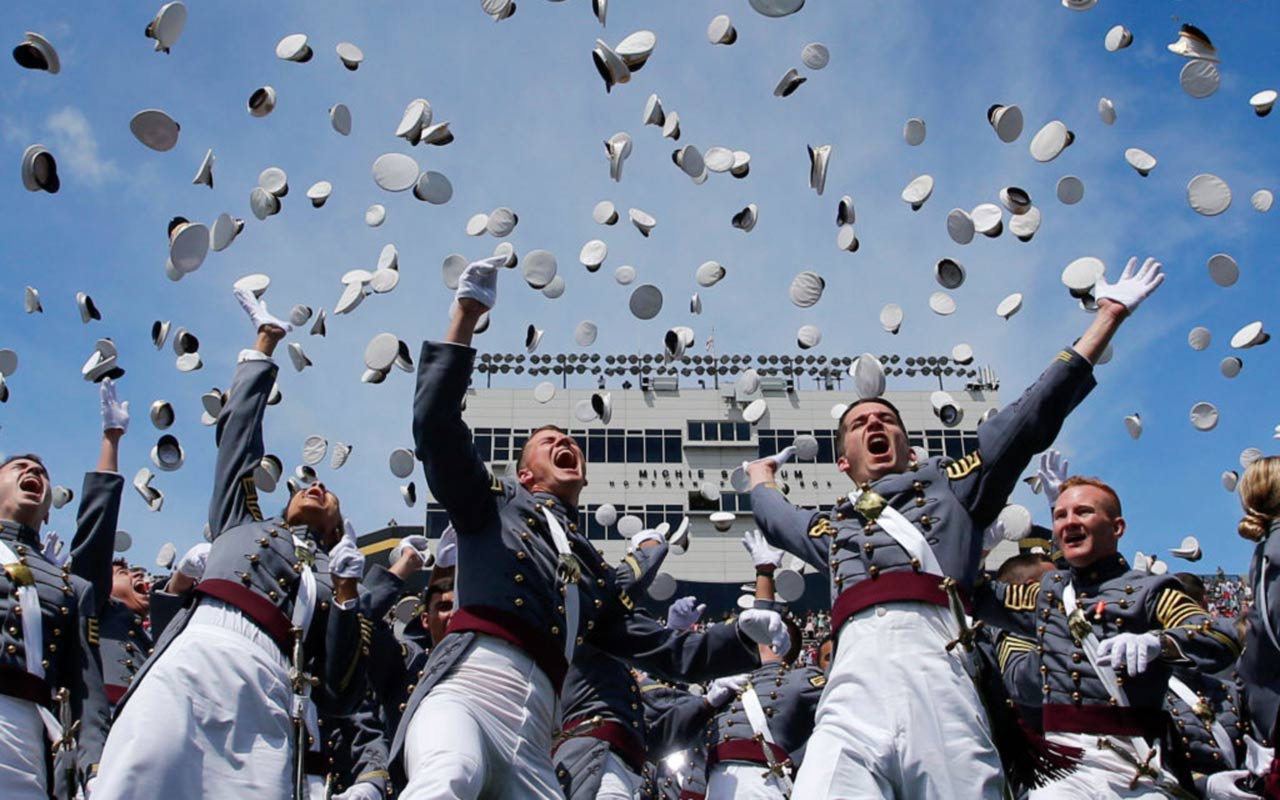
Profit and prosper with the best of Kiplinger's advice on investing, taxes, retirement, personal finance and much more. Delivered daily. Enter your email in the box and click Sign Me Up.
You are now subscribed
Your newsletter sign-up was successful
Want to add more newsletters?

Delivered daily
Kiplinger Today
Profit and prosper with the best of Kiplinger's advice on investing, taxes, retirement, personal finance and much more delivered daily. Smart money moves start here.

Sent five days a week
Kiplinger A Step Ahead
Get practical help to make better financial decisions in your everyday life, from spending to savings on top deals.

Delivered daily
Kiplinger Closing Bell
Get today's biggest financial and investing headlines delivered to your inbox every day the U.S. stock market is open.

Sent twice a week
Kiplinger Adviser Intel
Financial pros across the country share best practices and fresh tactics to preserve and grow your wealth.

Delivered weekly
Kiplinger Tax Tips
Trim your federal and state tax bills with practical tax-planning and tax-cutting strategies.

Sent twice a week
Kiplinger Retirement Tips
Your twice-a-week guide to planning and enjoying a financially secure and richly rewarding retirement

Sent bimonthly.
Kiplinger Adviser Angle
Insights for advisers, wealth managers and other financial professionals.

Sent twice a week
Kiplinger Investing Weekly
Your twice-a-week roundup of promising stocks, funds, companies and industries you should consider, ones you should avoid, and why.

Sent weekly for six weeks
Kiplinger Invest for Retirement
Your step-by-step six-part series on how to invest for retirement, from devising a successful strategy to exactly which investments to choose.
There are thousands of high school students out there dreaming about the day they'll toss their hat in the air and graduate from one of the nation's military service academies. If you're one of them, I hope your dream comes true and you're able to attend West Point, the Naval Academy, the Air Force Academy, the Coast Guard Academy or the Merchant Marine Academy. But you need to understand that it takes a lot of hard work and patience just to get through the application. My own son is a service academy grad, so I've seen for myself how difficult it is to get an appointment. But you can do it if you have the right stuff and know how the admissions process works.
To that end, we've pulled together a list of the most important considerations for students hoping to receive a service academy appointment someday. To bring our list to life, we interviewed 19 young men and women who recently went through the service-academy application process and earned an appointment to one (or more) of the five military academies. When it comes to the academy admissions process, they've been there, done that, and were eager to share their experiences, tips and advice with the next batch of service academy dreamers. With their guidance, here are 20 things you need to know about getting into a military service academy. If you're lucky enough to receive an appointment, you'll be rewarded with a tuition-free education at a first-rate school and an experience you'll never forget.
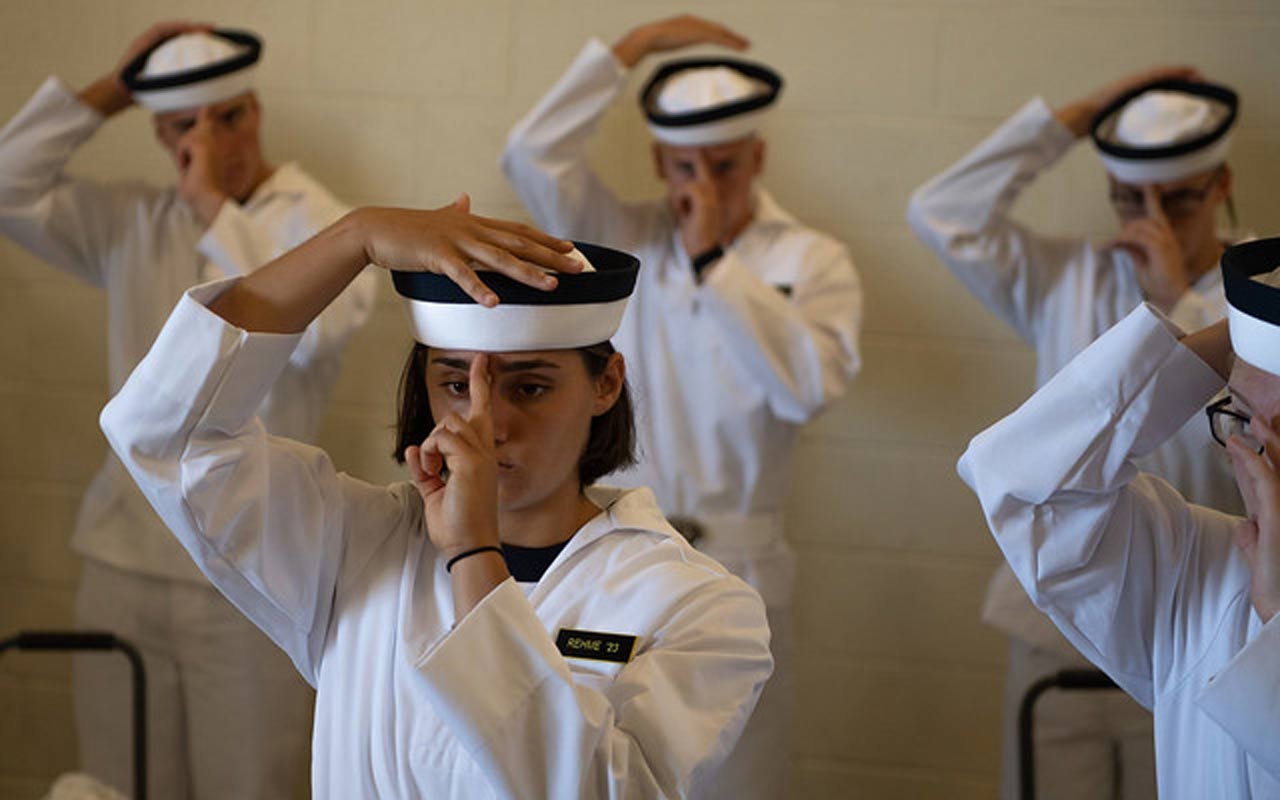
The Odds Are Against You
It's really hard to get into a military service academy. According to the National Center for Education Statistics, 41,989 people applied to the five military academies for the Class of 2023. However, there are only about 4,100 slots available each year. That puts the overall service academy acceptance rate at around 9.8%. (That's an average—it varies by academy.)
A 9.8% acceptance rate is higher than what you'll see at most Ivy League schools—where acceptance rates range from 5% (Harvard and Columbia) to 11% (Cornell)—and places such as Stanford (4%) and M.I.T. (7%). However, it's lower than the acceptance rate at many other very competitive schools, such as Johns Hopkins (11%), UCLA (12%), Georgetown (14%), Berkeley (16%) and Notre Dame (16%). (Rates are for Fall 2019 undergraduate admissions.)
_________________________
MARCHING ORDERS: Start Prepping Years in Advance
"Personally, it was very challenging" getting into a service academy, says Skye Williams, who is at West Point. "There are a lot of hurdles…you have to overcome." That's why many successful applicants started preparing themselves for a service academy early on in high school, or even sooner. Plan your high school course load, extracurricular activities, community involvement and athletic pursuits with the service academies' demands in mind.
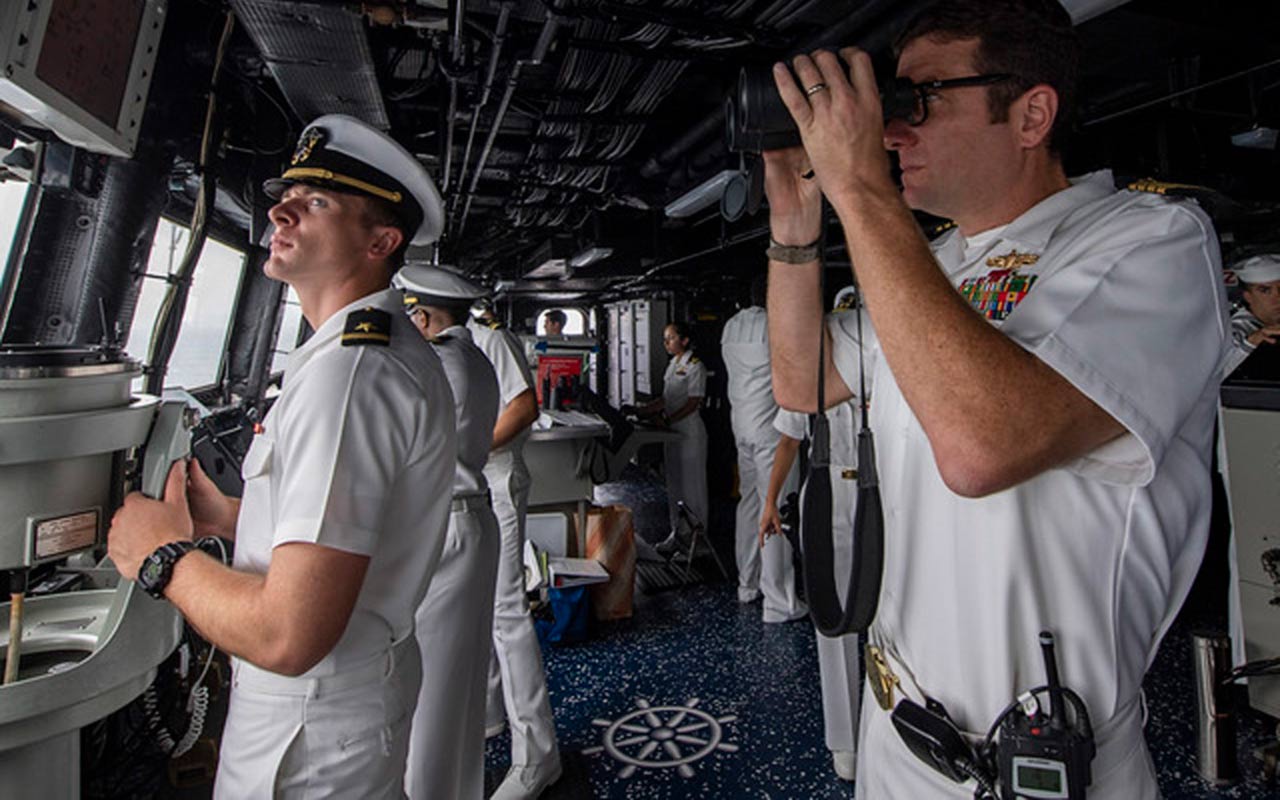
There's a Service Commitment After Graduation
If you attend a military service academy, the federal government will pay your tuition and room and board for four years, but Uncle Sam wants something in return. In most cases, you'll be required to serve on active duty in the U.S. military for at least five years after graduation. Longer service commitments are required for those who end up in certain jobs, such as pilots. West Point and Air Force Academy grads must also serve an additional three years in the reserves. Merchant Marine Academy grads are committed to either five years of active-duty military service, or five years in the maritime industry and eight years in the reserves. So, before even starting the service academy application process, make sure you understand and are comfortable with the post-graduation military service requirements.
While some graduates coming out of traditional colleges struggle to find work, that's not the case with service academy grads. Thanks to the service commitment, there's a 100% job placement rate for the young men and women coming out of the service academies. As the Coast Guard Academy's Natalie Wong noted, "It's definitely reassuring for a lot of people who are coming straight out of college to be guaranteed a job."
_________________________
MARCHING ORDERS: First Pick the Military Branch That Fits You Best
Because you'll spend more time serving in the military after graduation than you'll spend at a service academy, it's best to first pick the military branch that aligns best with your own goals and interests—Army, Navy, Air Force, Marines or Coast Guard—and then seek an appointment to the school that feeds officers into that branch. "It's four years of school, but then it's potentially a whole life as an officer in that branch," says Alexander Kleitz, who is attending the Air Force Academy. "It's the branch that you should focus on, and the school is a way to get there." The Naval Academy's Sawyer Neal agrees and urges high-school students who are interested in military academies to first find out "what you're actually going to be doing as an officer in those different branches and how different your life would be in each one." For example, Evan Sievers wants to be involved with military space operations, so he chose the Air Force Academy. The Coast Guard's humanitarian missions caught Lea Walker's eye, so she decided to attend their service academy. Renee Nosko, who isn't sure yet what she wants to do in the military, is headed to the Naval Academy "because of the Navy having…land, air and sea" opportunities. And then there's Connor McGurk, who is going to West Point to become an Army officer because he would "rather roll around in the mud than be stuck on some ship in the Pacific." Hooah!
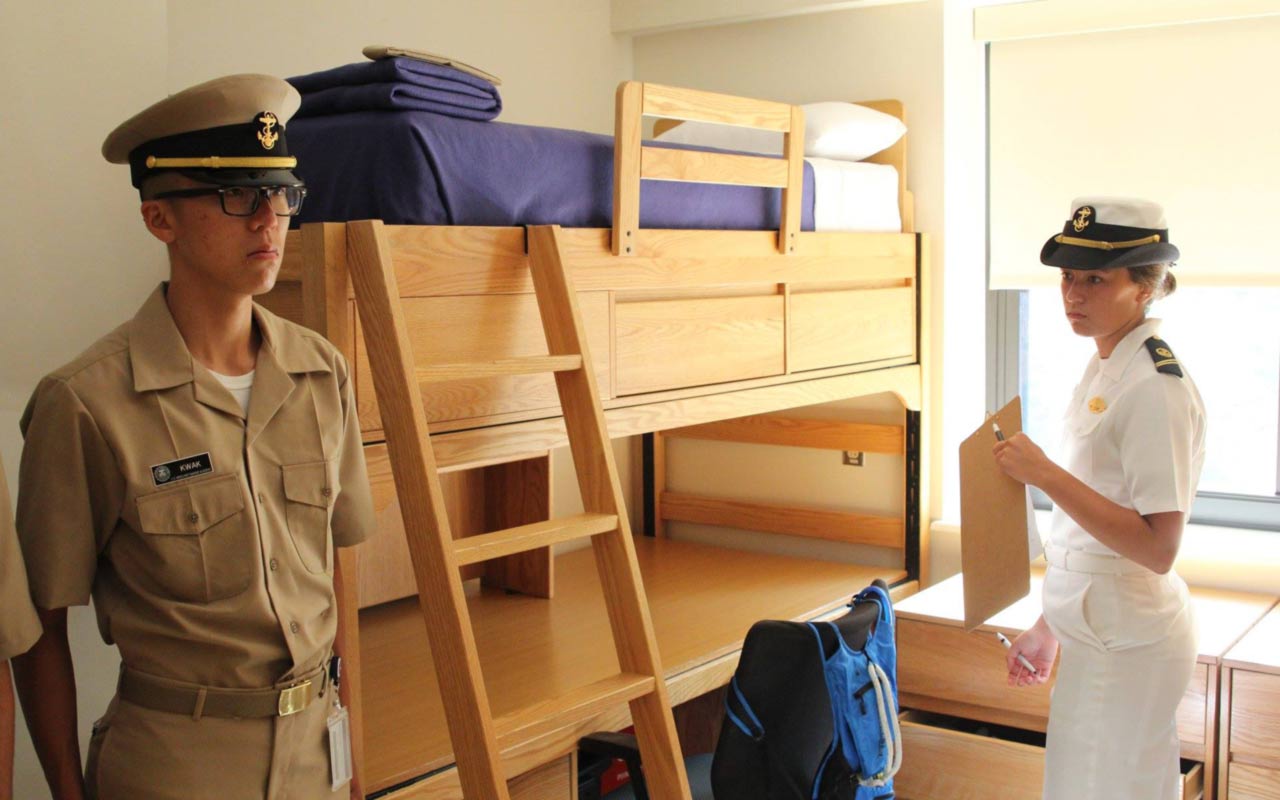
They're Looking for a Certain Type of Person
The military service academies aren't for everyone. But that's okay, because the service academies won't take just anybody, anyway. There are some basic qualifications for every incoming cadet or midshipman. They vary from one academy to another, but generally you:
- Must be between 17 and 22 to 25 years old (depending on the academy) on July 1 of the year you enter the academy;
- Must be a U.S. citizen (unless you're a selected international cadet/midshipman);
- Can't be married;
- Can't be pregnant;
- Can't have any dependents; and
- Must be of good moral character.
_________________________
MARCHING ORDERS: Don't Be Stupid—Stay Out of Trouble
That seems like a no-brainer, but you'd be surprised at how many service academy hopefuls lose out on their dream because they do something illegal, such as underage drinking or using drugs. The academies don't tolerate unlawful behavior when you're there (they'll kick you out), so what makes you think they're going to admit someone who has a troubled past? "If you think fun involves doing things that are illegal, and you either are applying to [a service academy] or have already been admitted to [one], it's a bad idea," warns West Pointer Andres Santiago. "It takes just one mistake…and all of a sudden you lose what you wanted the most." Oh, by the way, you'll have to submit a police records report and apply for a government security clearance if you're appointed, so don't lie about any past criminal history. Tell the truth, the whole truth and nothing but the truth.
_________________________
On top of the basic qualifications, you must also be a well-rounded individual—you need to be a scholar, a leader and an athlete. (We'll discuss these three requirements later.) As Naval Academy plebe Nathaniel Erickson notes, the academy admissions officers "don't want to see people who are just studs. They don't want to see people who are just book nerds. They want to see people who can succeed in all aspects of their life." If you're weak in one area, you can still get an appointment if you're strong elsewhere. So, for example, "if your test scores aren't as high as they could be, I wouldn't be too stressed about it," says Natalie Wong. "There are definitely other areas that you can really thrive in, and the admissions officers will see that on your application as well."
In addition, while it's great to do well in school and participate in school-based sports and extracurricular activities, a truly well-rounded student is involved off campus as well. "Volunteer. Get internships. Get jobs. Help your community out," says Louis Burts, who is at West Point. Those types of activities will get a service academy's attention just as much as playing sports or joining a club at school.

You Can Take a Test Drive
Not sure if a service academy is for you? Don't worry, because the academies have programs that let you get a taste of life as a cadet or midshipman. These programs come highly recommended from the group of cadets and midshipmen we spoke with, so make sure you check them out if you think you might want to attend a service academy. They'll help you decide if you're on the right path or need to head in another direction.
There are weeklong summer programs for rising high-school seniors. Four of the five service academies run these programs, which generally try to replicate the service-academy version of basic training. (The Merchant Marine Academy does not have a summer program, but you can attend another academy's program to get the general feel.) "It was a great experience," says Louis Burts. "I got a feel for what it's going to be like waking up early every day, doing PT every day, eating breakfast with everybody, going to class." For many students attending a summer program, they know right away if a service academy is right for them. The Air Force Academy's Seth Swain, for example, reveals that "after day two at the academy, I told my parents over the phone, 'Mom and Dad, this is what I want to do with my life, and I want to go to one of these academies.'"
The summer programs can also help you decide which service academy is right for you. "In terms of whether or not I wanted to go to a service academy," Alexander Kleitz says, "I don't think [attending a summer program] was that important. In terms of distinguishing between Air Force or Navy, which were the two on my list that I was debating about, it was absolutely critical. I could not have made that distinction if I had not visited both of them for a week."
Unfortunately, because space is limited at the service academy summer programs, you must go through a fairly competitive application process to be accepted into a summer program.
Whether or not you attend a weeklong summer program, you should look into the academies' day, overnight or weekend visitation programs, too. You'll get to shadow a cadet or midshipman during your visit and really see what life is like for them during the school year. "I was paired with a [Naval Academy] mid," Renee Nosko tells us. "I absolutely loved it because I got to go to class with her, I got to eat in the dining hall with her and really live out the full mid experience."
There are also advantages to being among the cadets and midshipmen in the barracks, because they'll tell you things you won't hear elsewhere. "I got a more unfiltered version of the school than you get from an admissions counselor," Burts notes.
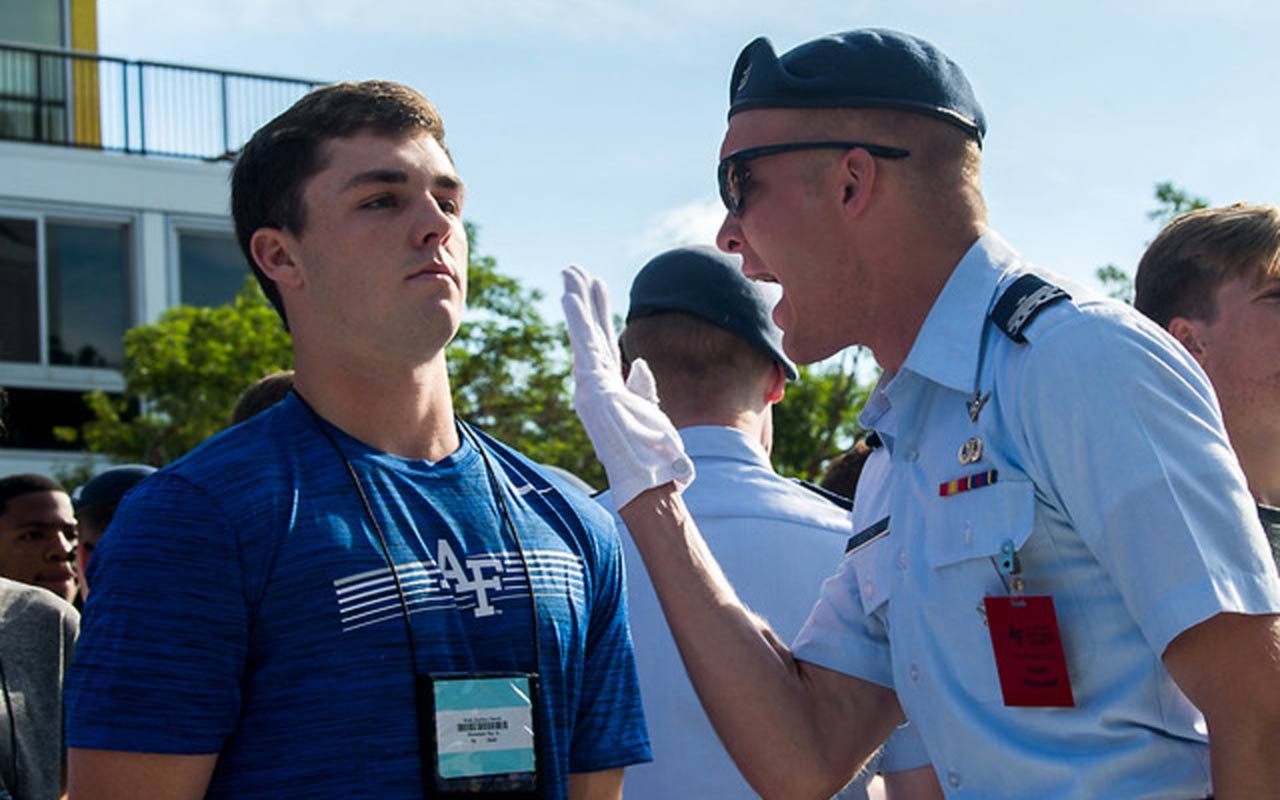
There's a Lot More to the Application Process Than Just the Application
When compared to traditional colleges, the service academy application process is "just a different animal" and "on a different level," according to Seth Swain. Both civilian schools and the academies require you to submit SAT/ACT scores, high school transcripts, letters of recommendation, writing samples and the like. However, the service academies also make you get a nomination, take a physical fitness test, pass a medical exam and go on interviews. (We'll cover all these additional requirements in more detail later.) "The service academy application process is definitely a lot more stressful, a lot more time-consuming and a little more grueling" because of these extra steps, said Dominique Basso, who is attending the Merchant Marine Academy. Plus, there are no "common applications" for the service academies. If you're applying to more than one academy, you must submit a separate application for each one.
Don't get discouraged by the application process, though. "There were so many times that I was on the verge of quitting," the Air Force Academy's Kayla Phillips confesses. She believes the academies make the process "long and annoying to weed out the kids who don't want to be there or don't have the determination or perseverance to be there."
The application timeline for service academies is typically longer than for traditional colleges, too. High-school students usually begin working on their applications to traditional colleges during the summer between their junior and senior years or during the first semester of their senior year. However, depending on the academy, the service academy application process usually gets under way in the second semester of your junior year of high school—as early as January in some cases. You might also have to submit a preliminary application or questionnaire to show that you satisfy the basic qualifications before you're even allowed to open a full application. In addition, while most service academy applicants learn their fate around the same time that civilian schools are sending out their acceptance letters, the academies may fill some slots as late as the day new cadets or midshipmen report for summer training.
In between the time you start your application and the time you receive an appointment, there are multiple deadlines that you better not miss. "Stay on top of all the deadlines," Rhett Perry, who is attending West Point, advises. If you make it into a service academy, you'll have to manage your time wisely. If you can't submit the necessary documents and complete the required tasks for your application before the designated cutoff dates, the academy is going to assume you won't be able to handle the packed schedule that cadets and midshipmen face every day. That's why West Pointer Jack Felgar warns prospective service academy applicants that "time management and just being persistent and getting everything done as quickly and accurately as possible is super-important."
_________________________
MARCHING ORDERS: Start the Application Process as Early as Possible, and Stay Focused
Because the service academy application process is so long and cumbersome, Lea Walker urges high schoolers to "start working on it early and try not to procrastinate, because deadlines can creep up" on you. Evan Sievers recommends completing as much of the paperwork as you can during the summer before your senior year, so you can focus on medical exams, nominations and the like during the fall.

You Have to Be a Scholar
Academics at the service academies are extremely challenging. So it's no wonder they have high academic standards for incoming cadets and midshipmen. As with most traditional colleges, the military service academies rely heavily on SAT and ACT scores. Although you can get an appointment with lower scores if you're strong in other areas, shoot for a combined SAT score (math and reading) of at least 1,260 to 1,300 or an ACT score of at least 29 to 31. Those are considered "average" marks for most years, so higher scores are even better. (Check to see if the academy you're applying to requires the SAT writing component as well.)
_________________________
MARCHING ORDERS: Take the Tests More Than Once
The academies super-score SAT and ACT results—for example, combining your highest SAT reading score and highest SAT math score, even if they're from different test days—and that can make a big difference. Nathaniel Erickson urges high-school students who want to attend a service academy to "take [the tests] as many times as you can, and take as many practice tests as you can." If you're really struggling with the SAT or ACT, Erickson suggests "focusing on one section at a time." For example, concentrate on the SAT's reading portion for one test, then pivot to math and take the SAT again.
_________________________
While your high school grade point average and class ranking are also important (shoot for a top 10% ranking), don't load up on "easy" classes to try to get straight A's. To be a competitive service-academy candidate, you need to challenge yourself with advanced placement (AP) classes, international baccalaureate programs, honors courses and the like. Yet, Alexander Kleitz notes that academy admissions officers told him that "it's better to have an A in a regular course than it is to have a poor grade in an honors course. So don't put yourself into honors courses that you can't pass. But if you can pass the honors course, that's definitely where you want to be." Louis Burts agrees: "If you take an AP class just to say you took it, and it's not a subject you're really good in,…it's going to end up hurting you in the long run."
_________________________
MARCHING ORDERS: Take College Courses if Your High School Offers a Dual-Enrollment Program
Dual-enrollment programs offer high-school students the opportunity to take college courses for credit. Skye Williams took dual-enrollment courses in high school, and she believes "challenging myself by taking college courses and, at the same time, taking high-school courses" helped her application stand out. You won't receive credit for the dual-enrollment college course at a service academy, but you might not have to repeat the class if it's a required course at the academy.
_________________________
It's also important to take (and do well in) math and science classes in high school, because the academy curriculums are S.T.E.M.-heavy. You definitely want to take calculus, physics and chemistry, says Alex Hooker, who is at the Naval Academy. Rhett Perry also recommends signing up for high school computer science classes. However, because the academies are looking for "well-rounded" individuals, you can't ignore non-S.T.E.M. courses. English, history and foreign languages are important as well. Dominique Basso also believes the college writing course she took "was definitely very helpful" for her academy applications because she picked up several tips for writing better essays.
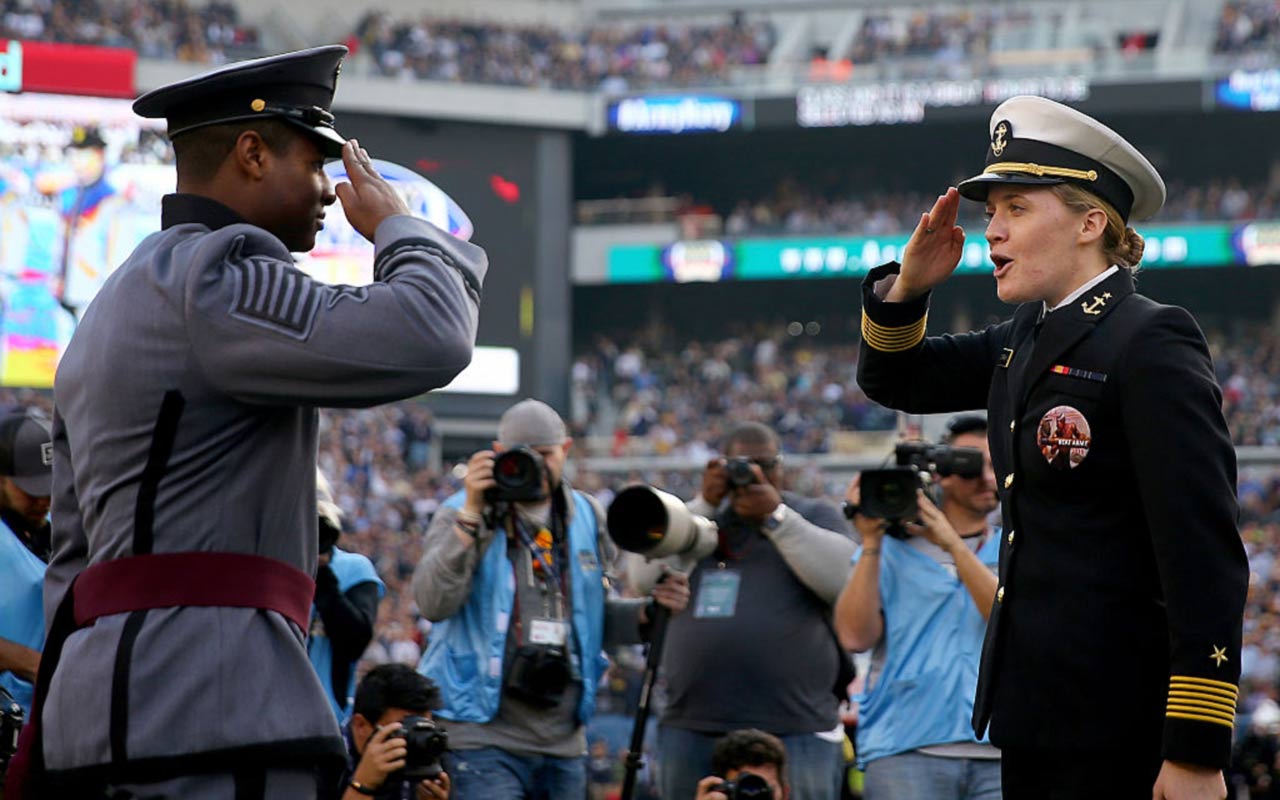
You Have to Be a Leader
The service academies' primary mission is to develop leaders. So, if you want to get an appointment to an academy, show them you're already a leader. There's an endless list of ways that high schoolers can gain leadership experience. A few common examples from the incoming cadets and midshipmen we talked to include:
- Sports team captain;
- Club founder or officer;
- Eagle Scout or Gold Award recipient;
- Student body or class officer;
- Boys State or Girls State delegate; and
- Editor of the school newspaper or yearbook.
_________________________
MARCHING ORDERS: Think "Quality Over Quantity" When Choosing Your Activities
"When it comes to clubs, you have to be in leadership positions," says Seth Swain. "They're looking for quality, not quantity. You don't need to be in 20 different clubs and just be a member.… If you are in three or four and are in leadership positions, that really helps." Ultimately, it's better to be a leader in one activity than to be a follower in 10.
_________________________
While often overlooked, the high school Junior Reserve Officers' Training Corps (JROTC) programs sponsored by the Army, Navy, Air Force and Marines also provide leadership experiences that the service academies like to see. Skye Williams participated in her local JROTC program, and she believes it was an important factor in getting her appointment to West Point. The admissions officers could "see that I have military bearing and leadership skills on that level," she says, "so I feel like that was a big plus for me." If there isn't a JROTC program at your school, consider the Civil Air Patrol Cadet Program, Naval Sea Cadet Corps or the Young Marines, which offer similar military-based leadership opportunities.
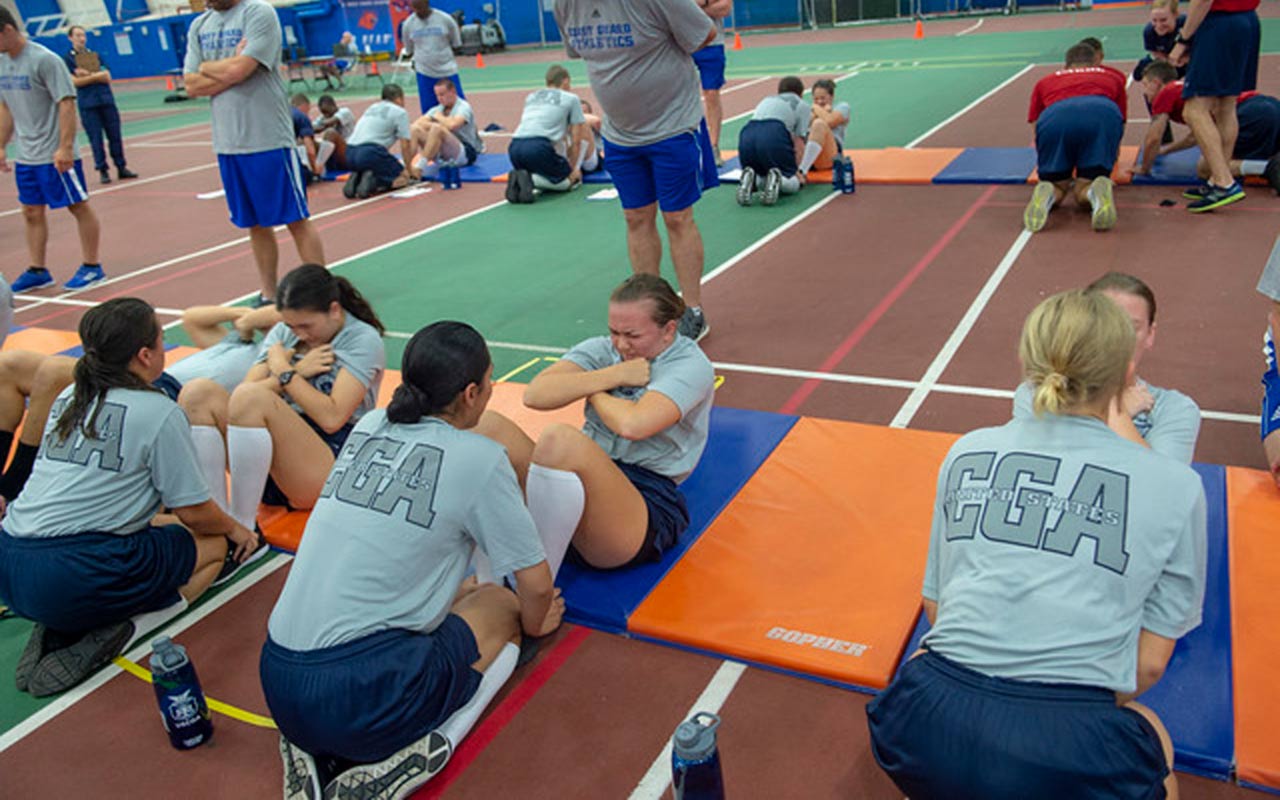
You Have to Be an Athlete
If you're going to survive the physical demands of service-academy life, you better be in shape! Not only will you be required to keep up during physically demanding military training exercises—such as marching 10 miles with a 40-pound pack on your back—but all cadets and midshipmen are expected to participate in some sort of athletic activity either at the NCAA, club or intramural level. Depending on the academy, 85% or more of all appointees earn a varsity letter in high school, which should tell you something about the type of young men and women the service academies want. Couch potatoes need not apply!
To make sure you can handle the physical challenges cadets and midshipmen face every day, you must take and pass a physical fitness test to receive an appointment. All service academies, except the Coast Guard Academy, use the Candidate Fitness Assessment (CFA) to test your athletic ability. The CFA is made up of the following six events:
- Basketball throw (while on your knees);
- Pull-ups or flexed-arm hang (women's option);
- 40-yard shuttle run;
- Crunches;
- Push-ups; and
- One-mile run.
The Coast Guard Academy uses its own Physical Fitness Exam (PFE), which consists of sit-ups, planking and a 1.5-mile run.
With the CFA and PFE, practice makes perfect. Figure out which events are the most difficult for you, and start doing them over and over to improve your results. "It's really just about repetition and doing it as much as you can," according to Nathaniel Erickson. "If you struggle running, go run." Start practicing well in advance, too. Renee Nosko, a high-school runner who had trouble with some of the strength-based events, started lifting more weights "all throughout the summer and into the school year" before taking, and passing, the CFA in the fall.
_________________________
MARCHING ORDERS: Practice Throwing a Basketball
Pull-ups—check. Push-ups—no problem. Mile run—OK. Basketball throw—what?! How the heck did throwing a basketball as far as you can while on your knees get on the CFA? Rhett Perry has an idea. "My theory," he says, "is that the basketball throw is just there to make sure that you're going to learn how to do something. You can't just go out there and throw a basketball and actually throw it really far on your first try. It takes a lot of practice to get the technique down, because it's not all about strength. It's just technique. When you throw the basketball, it's only going to go far if you've thrown it a hundred times before. So, when you do the CFA, they make sure you really are committed to doing this and you practice and train for it."
_________________________
The CFA and PFE are pass/fail tests. Yes, you need to pass the test to get an appointment, but don't get too upset if you don't get the best score possible ("max out") on each event. The academies would "love to see on your application that you maxed your CFA," says Seth Swain, "but at the end of the day, it's not about maxing totals." Instead, you want admissions to say, "This kid has physical aptitude and he can run, and he can do push-ups and sit-ups…we're going to take him, because we know he can make it here."
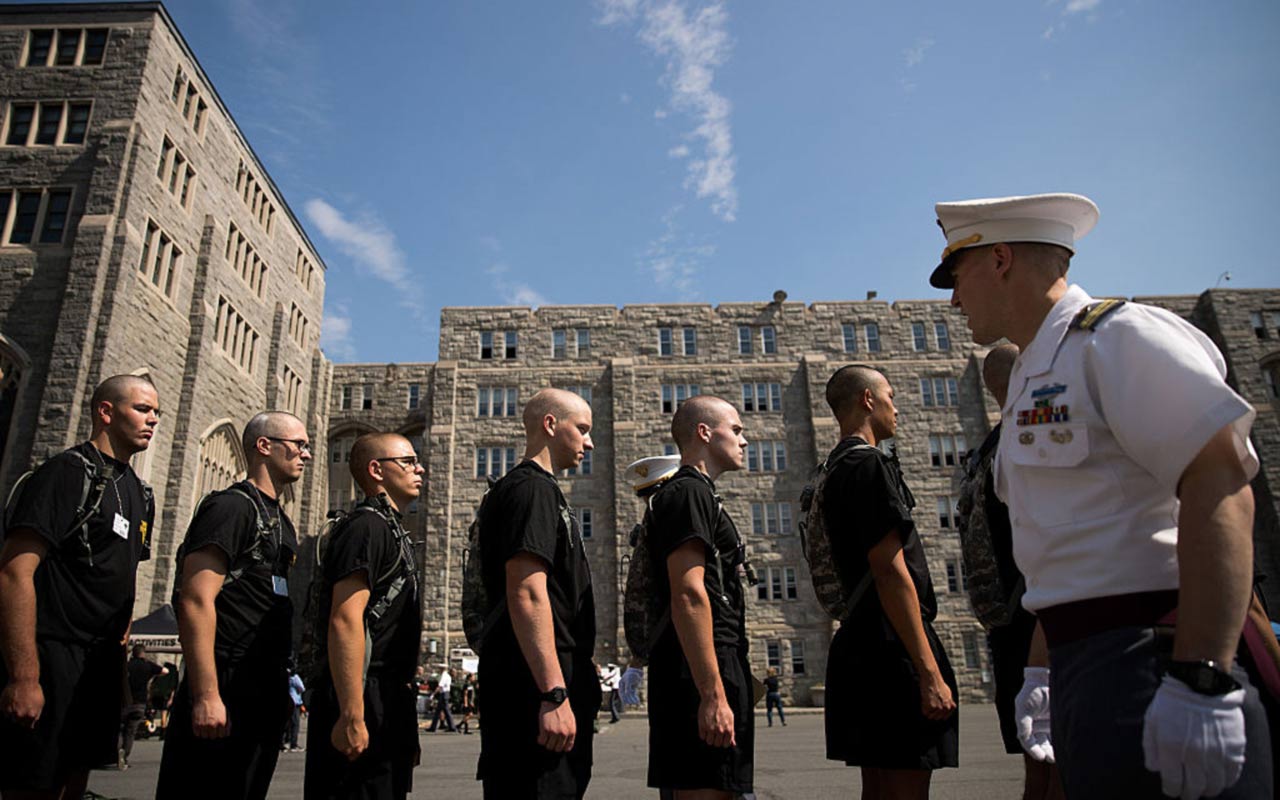
You Need a Nomination
The nomination requirement is perhaps the most unique part of the service-academy admissions process. To be considered for an appointment to a service academy (other than the Coast Guard Academy), you must have a nomination from an authorized nominating source. There are several nominating sources, and "you should apply to all sources for which you qualify," according to Alex Hooker. That will increase your chances of getting at least one nomination for the academy you want to attend, which is all you need. Getting an additional nomination, Andres Santiago says, "increases your chances [of getting in] dramatically" because "it puts your name in a different pool" from which you can be chosen for an appointment.
Members of Congress—U.S. senators and representatives—are the most common sources of service-academy nominations. They account for about 75% of all appointments. Each U.S. senator and representative can have as many as five cadets or midshipmen nominated by them at each service academy at any one time. If they have fewer than five at an academy, they can nominate up to 10 applicants to that academy for every open slot. For example, if the Naval Academy currently has three midshipmen who were nominated by a particular U.S. senator, that senator can nominate up to 20 Naval Academy applicants for the incoming class (10 for each open slot).
_________________________
MARCHING ORDERS: Look for Informational Sessions Hosted by Members of Congress
Many U.S. senators and representatives hold informational meetings for young men and women interested in applying for a service-academy nomination. They'll run through the nomination process and answer any questions you have. You can also meet the congressional staffers who will be handling your application. You might be able to get a head start, too. "I think it was pretty valuable," says the Air Force Academy's Courtney Swift. "I'm happy I went because I got some paperwork done…so they had me in the system right away." Rhett Perry also appreciated the opportunity to meet with admissions representatives and current cadets and midshipmen at one of his senator's events. "That played a big role in my application process," he says, "because I was able to talk to these people."
_________________________
There are three methods members of Congress can use to submit their lists of nominees. The most common method is to submit what is called a "competitive" list, where the nominees for each open slot are unranked. In this case, the academy ranks the nominees based on merit and offers an appointment to the most highly qualified person. If a member of Congress submits a "principal with competing alternates" list, the nominee designated as the principal nominee will receive an appointment if he or she is otherwise fully qualified. (Obviously, you want a principal nomination if you can get it!) However, if the principal nominee is not qualified, the most qualified unranked alternate gets the nod. Finally, a member of Congress can submit a "principal with numbered alternates" list, which means that a principal nominee is designated and the alternates are ranked in order of preference. Once again, the principal nominee gets an appointment to fill the slot if he or she is fully qualified. If that person is not qualified, the highest designated nominee who is qualified gets the appointment for that slot.
Every service academy applicant should apply for at least three nominations—one from each U.S. senator from his or her state and one from the U.S. representative from his or her congressional district. (If you're applying to the Merchant Marine Academy, you can also get a nomination from a representative from another district within your home state.) However, this adds a significant amount of additional time and effort. "Each nomination application is like a whole other normal college application," says Evan Sievers. While each congressional nomination application will be different, you typically have to write essays, submit transcripts and standardized test scores, complete a questionnaire and the like. Each member of Congress will most likely have you interview with a review board, too.
Applicants often get butterflies in their stomachs when facing a nomination review board. The boards typically include current or former military officers—many of them service academy graduates—who can be a bit intimidating. To get on their good side quickly, Kayla Phillips reminds applicants to "use ma'am and sir in the room because that's what you use at the academies." They might even try to fluster you by throwing an odd question at you that you totally weren't expecting, but Phillips advises candidates to simply "think about it before you answer the question." It's also important to be relaxed. "If they ask you 'what are your favorite hobbies,' sometimes you might just freeze or be so struck by such a simple conversational question," says Jack Felgar. However, he found that "just kind of having fun with it and being relaxed helped me a lot." While the interviews can be a tough, Kayla Malone, who is attending the Naval Academy, insists that they get easier if you "just learn from every interview" and apply it to the next one. For her, "the interviews just kept getting better and better."
The U.S. Vice President is another nomination source. Like members of Congress, he or she can have a maximum of five cadets or midshipmen at each academy at any one time. For each available slot, the Vice President may nominate up to 10 candidates. Every applicant is eligible for a vice presidential nomination and should apply.
Presidential nominations are available for children of career military officers and enlisted personnel. While an unlimited number of presidential nominations can be given, only 100 candidates per year can be appointed to an academy with these nominations.
Other nominations are available for:
- Enlisted military personnel;
- ROTC and JROTC students;
- Children of military personnel who were killed in action, died while on active duty, or were disabled while on active duty;
- Children of military personnel who are currently prisoners of war or missing in action; and
- Children of Medal of Honor recipients.
There may be limits on the number of these nominations allowed or on the number of appointees with these types of nominations.
The Merchant Marine Academy only accepts congressional nominations.
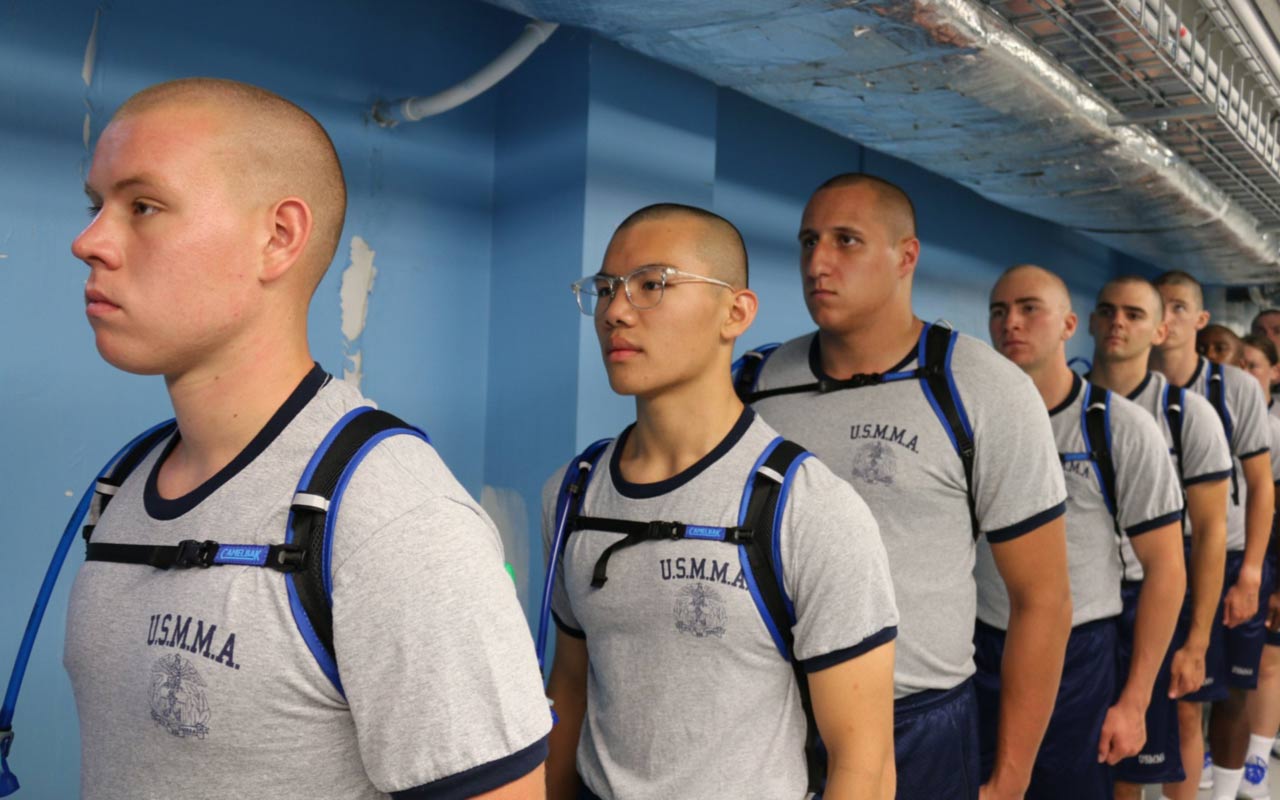
A Medical Condition Can Keep You Out
There's an unfortunate scenario that plays out all too frequently: A young man or woman works hard for years to become a scholar, leader and athlete worthy of a service-academy appointment, but is denied admission because of a disqualifying medical condition. There's a pages-long list of disqualifying conditions that can trip up a service-academy candidate. They include dental problems, poor vision, teenage asthma, broken bones that didn't heal properly, joint issues, skin disorders, hearing problems, food allergies and more. You can even be disqualified for failing to meet military height and weight requirements. The medical standards are in place to ensure that each person entering military service is physically able to handle the "rigors and stressors of military training and missions."
_________________________
MARCHING ORDERS: Check Your Prescriptions
You can also be disqualified for taking certain prescribed medications. We talked with one cadet candidate who was denied an appointment the first time he applied because of medicine he was taking. Connor McGurk received an appointment to the West Point Class of 2022 in January of his senior year of high school, but he was medically disqualified in late April because he had taken prescribed medicine that he "had to be off of for a certain period of time" before reporting for summer training. By the time he found out, it was too late to stop taking the medicine and still hold on to his appointment. (Fortunately, he was given a slot in the Class of 2023.) As a result, McGurk warns applicants who are taking prescription medications to "make sure you won't be disqualified based on what you're taking."
_________________________
Service academy candidates who have completed certain parts of their application are contacted by the Department of Defense Medical Examination Review Board (DoDMERB) and asked to schedule a medical exam. After the exam is completed, DoDMERB might ask you to provide additional information or medical records, or even want you to schedule additional medical appointments. Once all the necessary information is collected, DoDMERB reviews your medical record and determines if you're medically qualified or disqualified.
All is not lost, however, if you're initially disqualified, because you could get a medical waiver. DoDMERB doesn't give out waivers—the academies do. So, if the academy really wants you, you still have a shot at an appointment.
Under the best of conditions, it can take a month to schedule your initial examination, two more months to get all the information to DoDMERB and another month (or more) to get a medical waiver if required. If everything goes according to schedule, that's a four-month process…and it can be longer if there are bumps in the road! That's why it's important to get the DoDMERB process started as soon as you possibly can. That means knocking out the initial parts of your application quickly, so your name is sent to DoDMERB sooner. Jack Felgar got through the DoDMERB process relatively quickly, despite hitting a snag over a year-old football injury, because he was able to start the process before most of the other applicants. "Getting everything done so early helped because at that point it was still early in the DoDMERB process," he says. Because he was "probably one of the first people to have a DoDMERB appointment, they weren't all backed up yet, and they didn't have thousands and thousands of applications from all the academies pouring into their system yet. So getting it done so early definitely helped."
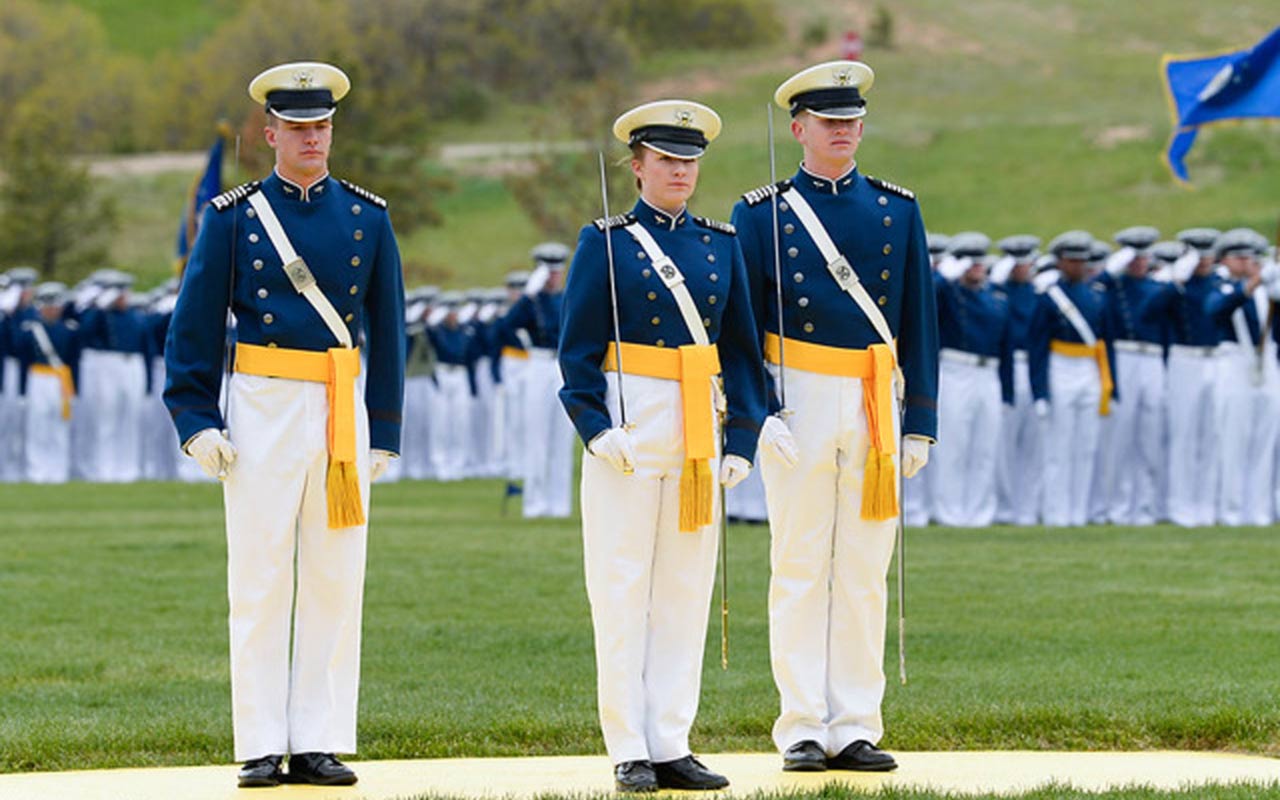
Local Admissions Representatives Can Help You Get In (or Keep You Out)
In addition to the academy-based admissions teams and regional admissions officers, the service academies have local representatives throughout the country who volunteer their time to mentor high school students seeking appointments. The Naval Academy calls them Blue and Gold (B&G) Officers, the Air Force Academy calls them Admissions Liaison Officers (ALOs), West Point calls them Field Force Representatives (FFRs), the Coast Guard Academy calls them Academy Admissions Partners (AAPs), and the Merchant Marine Academy calls them Admissions Field Representatives (AFRs).
_________________________
MARCHING ORDERS: Turn Your Local Rep Into Your New Best Friend
Local representatives can be a great source of information, guidance and support. Louis Burts says his FFR "was probably my best friend throughout this process, besides my mom. If I had a question, I could text her or call her on anything." Kayla Malone has similar praise for her B&G officer: "I don't know what I would have done if I didn't have her…she knew all the little ins and outs of everything that you need to know." "Utilize your Blue and Gold officer," Sawyer Neal advises future Naval Academy candidates. "Ask them questions. Don't be afraid to call them every once in a while. Set up a phone call to talk to them and give them updates on how you're doing."
_________________________
The Naval Academy and Air Force Academy require interviews with a local representative as part of the overall application process. West Point and the Coast Guard Academy don't require interviews for every candidate, but they can request an interview (say yes!) or you can ask for one yourself. The Merchant Marine Academy doesn't do interviews, but candidates can ask to meet with a local representative. Interviews allow you to "personalize" the application process. Instead of just reading about you, someone reporting directly to the admissions office will actually get to see you, talk to you and get a sense of what you're all about. That can be a tremendous opportunity for candidates, particularly if you don't have the highest test scores or top-flight athletic abilities. Of course, if you make a bad impression, it could harm your chances of getting an appointment. So make sure you follow all the regular tips and advice about making a good impression during interviews: Look professional, sit up straight, stay calm, speak clearly and the like.
In many cases, the interview with a B&G officer or ALO will be more low-key than the interviews with the nomination review boards. According to Alexander Kleitz, the Air Force "ALO interview now is over Skype or Facetime or some sort of video messaging service." For Courtney Swift, the interview was about "getting to know me as a person" and determining if she "wants to go to [the academy] for the right reasons."
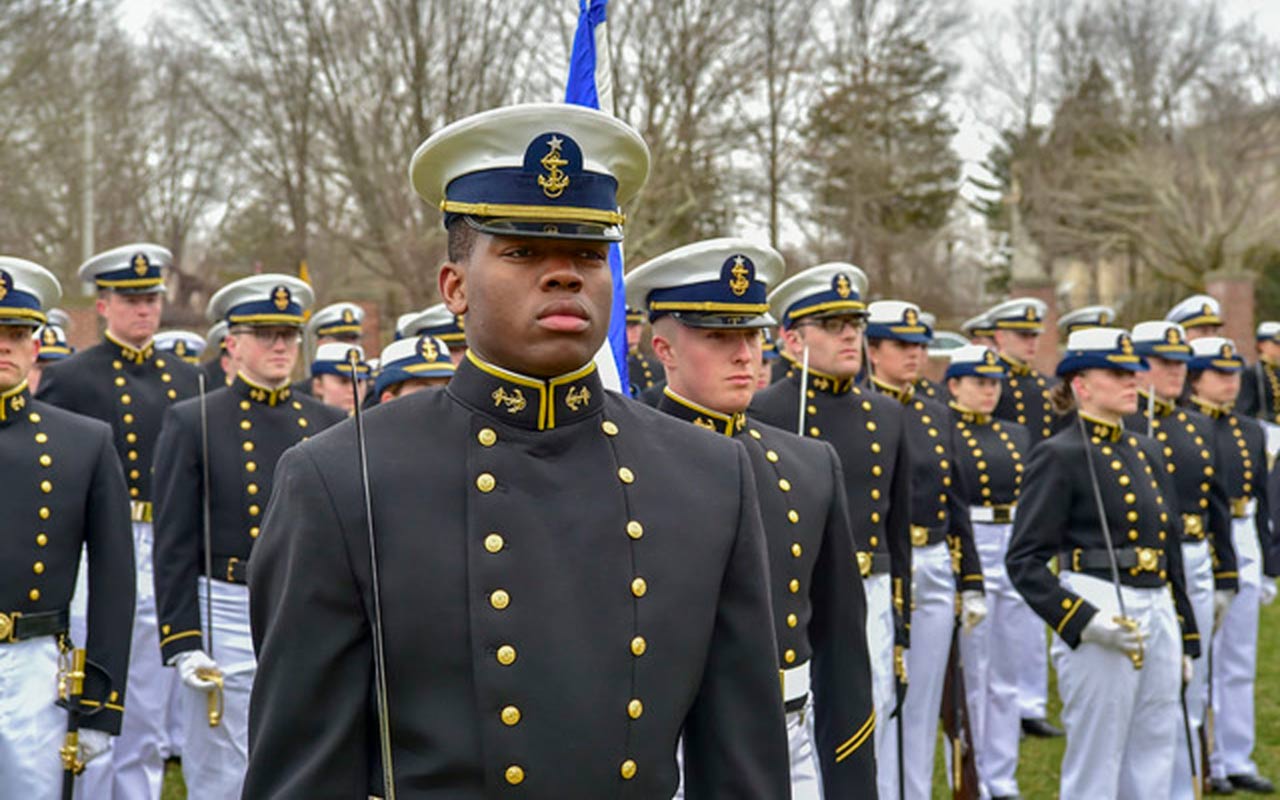
Minority Appointments Are on the Rise
There are no racial or ethnic admissions quotas at the military service academies. However, they are reaching out to qualified minorities and encouraging them to apply. For example, the Coast Guard Academy's Genesis Invitational outreach program brings prospective minority applicants to the academy for overnight visits where they can tour the campus and shadow a cadet. For Lea Walker, the experience was a "pretty valuable" part of her decision to apply to the academy. It allowed her to see the "academic side" of academy life and gain a more "well-rounded" understanding of what it's like to be a cadet.
The service academy admissions teams also include diversity officers who focus on helping minority candidates through the application process. (All candidates have access to regional admissions officers for similar assistance.) Skye Williams worked with a diversity officer who was "very influential and very helpful and very encouraging for the whole process. As soon as I started the application, she was already on me, sending me messages and encouraging me." Louis Burts also praises the West Point diversity officers. "To me, what was most important was that they weren't pandering," he says. "They weren't like, 'Hey, you're black, come to our school.' They didn't see me as a minority candidate. They saw me as a candidate. They saw me as an individual person, who they wanted to come to the school, and that made me feel very valued. Other schools would specifically mention, 'Hey, you're a minority, we want you to come here.' The West Point officers weren't like that with me. They were like, 'Hey, we think you'll be good for the school—come here.' And I think that's what made the difference for me. I wasn't seen as a statistic or someone to boost their minority numbers."
The academies' outreach efforts are paying off—minority admissions are on the rise. Based on the most recent data available, minorities account for about one-third of all incoming service academy cadets and midshipmen today. Those numbers have been rising over the past few years. Take West Point, for example. In 2009, about 25% of the incoming class were minority students. Eleven years later, that number has jumped to about 40% for new cadets reporting in 2020.
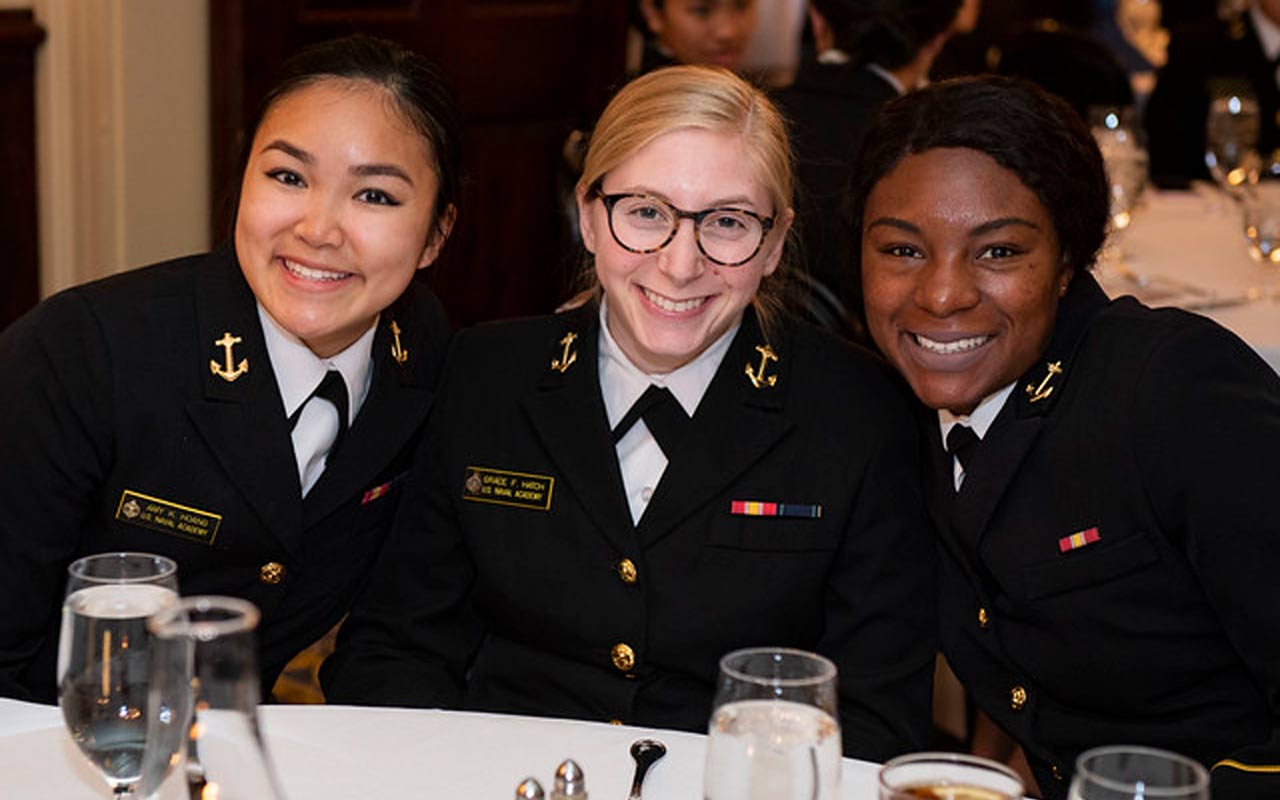
More Women Are Getting In, Too
Along with an increase in minority admissions, more women are attending the service academies these days, too. Women weren't allowed to attend the academies until 1976. Since then, their numbers have been steadily rising.
Now, roughly one-quarter of all cadets and midshipmen are women. That's a big jump from a decade or so ago. Again, looking at West Point as an example, less than 15% of the new cadets entering the academy in 2009 were women. In 2020, women make up more than 23% of the incoming class.
One hurdle the admissions officers face when it comes to recruiting more female applicants is the notion that the service academies are still male-dominated environments. "Obviously, there's a lot more guys than girls at the academies," Courtney Swift points out, "but I feel like it's kind of always going to be that way. There's going to be an imbalance." Likewise, Dominique Basso has "always known that the military is a more of a male-dominated field…I just accepted it." The trick to calming any worries about being unable to succeed in a testosterone-heavy world seems to be visiting the academies and talking with women who have experienced academy life. By "just talking with other females either in the academy or who had gone through it," Renee Nosko realized that "plenty of other females have done this before me. While we may not be in the majority, it is definitely doable, and it is in fact worthwhile. Because they influenced me, and I'll influence another generation, it will just grow and grow and grow until eventually we'll have equal service between men and women."
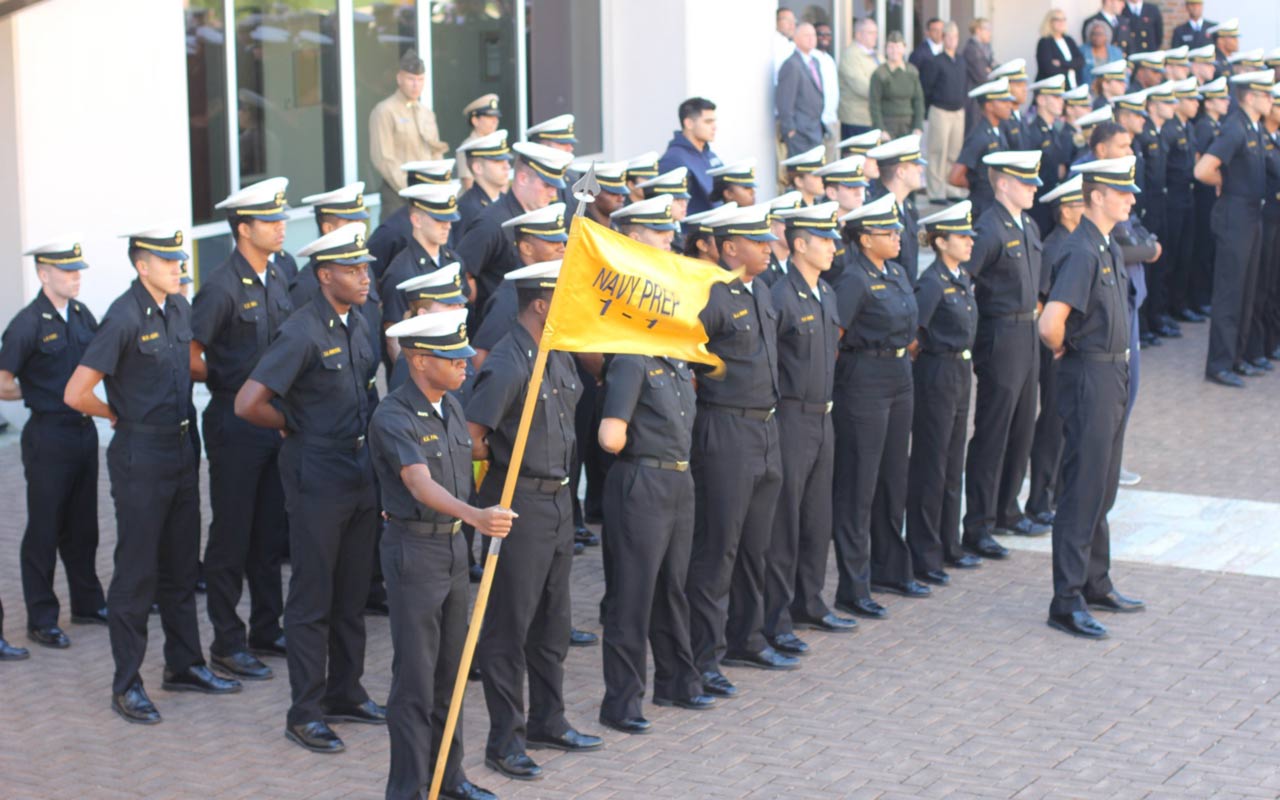
You Could End Up at a Prep School First
What if a service academy wants you because of your athletic or leadership abilities, but you don't quite meet the school's academic standards? An admissions officer might ask you to spend a year at a prep school to strengthen your academic standing and test scores before moving on to the academy itself the following year. (You don't request it—they offer it to certain applicants who don't receive a direct appointment, often recruited athletes and enlisted military personnel who have been out of school for a while.) You're not guaranteed a slot at the academy the following year, but the majority of prepsters successfully complete the program, become fully qualified and receive an appointment.
West Point, the Naval Academy and the Air Force Academy run their own preparatory schools. The Coast Guard Academy sends its prep students to either the Naval Academy prep school or to selected private military prep schools. The Merchant Marine Academy only sends its prep students to private military prep schools. Financial assistance is typically offered to offset the costs of attendance at private prep schools or military junior colleges, such as New Mexico Military Institute, Marion Military Institute and Georgia Military College.
At a prep school, you'll prepare for the academy by living the lifestyle of a cadet or midshipman at the academy. So, in addition to taking college-level classes, you'll wear a uniform, go through military training, follow military discipline, participate in organized sports and so on. "It was the best preparation that anyone could have," says Kayla Phillips, who attended the Air Force Academy prep school. "I didn't know how to march, I didn't know how to put on a uniform…or make a bed, but I was taught all that. I'm already prepared for what's going to happen at basic training."
In addition to running their own prep schools, West Point, the Naval Academy and the Air Force Academy also send a handful of fully qualified candidates who didn't receive an appointment to private military prep schools or military junior colleges for a year. These are typically candidates who are "on the bubble," often because they come from a highly competitive congressional district. The academy wants them but just can't find a slot for them at that time. Again, an appointment the following year isn't guaranteed, but it's generally understood that an appointment is "yours to lose." In other words, if you do well at the prep school and stay out of trouble, you'll get an appointment to the next year's class. The academy alumni associations also provide scholarships to help pay for the private school costs. These scholarships are known as AOG Civil Prep Scholarships (West Point), Foundation Scholarships (Naval Academy) and Falcon Foundation Scholarships (Air Force Academy).
_________________________
MARCHING ORDERS: Don't Turn Down a Prep-School Offer
"If you do get into the prep school, please take it," Phillips urges younger students. "I was so disappointed when I found out I got prep school, because everyone wants to go to [the academy]. It was almost like I got second place. But I wouldn't have changed anything, because there's no way I would honestly survive if I hadn't gone to the prep school first. It's just the perfect way to prep you before you go to [the academy]."
_________________________
Candidates not selected for one of the academy-sponsored prep school programs can always attend a private military college on their own dime to help improve their chances of getting an appointment the following year. It's a bit risky, but it can work. This is the path Andres Santiago took. He believes attending the private school was a "foundational" part of ultimately earning his appointment to West Point and that "the training really does help prepare you" for an academy. For instance, he "didn't have that high of an SAT score" before going to the prep school, but the instruction he received at the school "increased my math score by about 70 points." Santiago benefited in other ways, too. Going the prep-school route is helpful "if you've never had any taste of military life or any form of discipline whatsoever," he says. "It just gives you a feel for the military grit and the attitude you need to have." Finally, Santiago believes attending a prep school also shows an academy that you're "trying things to strengthen yourself and improve yourself, which looks very good on an application."

Enlisted Men and Women Can Apply
If you've already enlisted in the military, you can still apply to the service academies if you want to further your education and become an officer. In fact, the academies often have slots reserved for active duty or reserve enlisted personnel that go unfilled each year. They also have special admissions officers who work exclusively with enlisted applicants, so you can get a little extra help with your application. Enlisted applicants who don't receive a direct appointment are automatically considered for the prep school, too.
There are, however, a few differences in the admissions process for enlisted soldiers, sailors and airmen who are applying to an academy from the ranks. For example, high-school teacher recommendations are generally not required for enlisted applicants. Recommendations from officers in the applicant's direct chain of command are required instead. There's also a special nomination source available for enlisted personnel, so a congressional nomination is not required. (Although, as with other applicants, enlisted applicants are still encouraged to apply for all nominations for which they qualify, including congressional nominations.) Enlisted personnel who are nearing the end of their service obligation may also have to extend their enlistment or reserve agreement for a year or two in order to attend the academy or prep school. Other variations may apply.
As a cadet or midshipman with prior military service, you'll have a leg up on your fellow classmates in many areas. You've been through basic training, lived the military life and, in some cases, experienced combat. The other cadets and midshipmen will respect you for that and seek your advice.

Recruited Athletes Don't Get (Much) Special Treatment
Sports play an important role in the service academy experience—especially when it comes to competing against rival academies. (Ever heard of the Army-Navy game?) Because of this emphasis on sports, the academies work hard to recruit qualified athletes. But the academies are at a recruiting disadvantage, because all cadets and midshipmen must meet their high standards for admission.
The academies have, however, found ways to enhance the recruiting process while still making sure all athletes are fully qualified and deserving of their appointments. For instance, the three largest academies—West Point, the Naval Academy and the Air Force Academy—have special admissions officers that deal directly with candidates who are recruited athletes. According to Jack Felgar, who was recruited by West Point to play sprint football, these admissions officers "help you through the process a little bit, and they guide you a little bit more." The special admissions officers might be able to streamline the process for athletes, too. "I can't say this for sure," Felgar notes, "but I think that some of the things like getting cleared by DoDMERB or just having forms upload and then confirmed seemed to come a little bit faster and be prioritized a little bit higher." As with traditional colleges, the coaches can chip in, too. Courtney Swift, who will play tennis at the Air Force Academy, tells us that the application process for recruited athletes is "pretty much exactly the same, except you just have a coach helping you and guiding you a little bit more through the process." However, she "still had to do everything anyone else applying would have to do, like starting the application, doing all the testing, medical and getting a congressional nomination."
Without going into detail, there are also several special NCAA recruiting and eligibility rules that apply only to the military service academies. For one, the NCAA prohibition against paying student athletes is waived because all service academy cadets and midshipmen are paid. NCAA scholarship limits don't apply to service academies, either, because there are no "scholarships" for cadets and midshipmen—they all attend for free. This means that the service academies can bring in more athletes for their sports programs. There are also other special NCAA rules for service academies concerning contact periods, official visits, weight-training and conditioning schedules, the number of coaches allowed and more.
Because of the service academies' high standards, unique lifestyle and service commitment, academy coaches seem to take a different approach to recruiting athletes. "I'd say that Navy was looking at me as a person and a student at the Naval Academy before even looking at me as a player," says Kayla Malone, who is a volleyball player. "I felt like other schools just looked at you as an athlete and not as an asset to their school in any other way." Felgar had a similar experience at West Point. "One of the biggest things that my coaches stressed to me was that, obviously we're recruiting you to play ball here, but we're also recruiting you to be in the Army," he points out. "So they make it really clear from day one that they want you, but if you choose this lifestyle, you'll still serve on active duty for five years and in the reserves three years, you're still going to go to one of the toughest schools in the nation, and it's a whole different ballgame."
_________________________
MARCHING ORDERS: Connect with Coaches and Team Members
The recruited academy athletes we spoke to also had some advice for high school students who want to play on an NCAA team at an academy. "I think the first step would be reaching out to the coaches…and start a relationship with them," says Swift. "If you have a good foundation with the coaches, they'll really help you get through your application." Felgar advises high school athletes to be "proactive" and "get more film to send to your coaches, whatever sport your play, because that's what they love to see." Try to connect with some of the current players, too. "It would suck if you went and didn't really know what you're getting yourself into….Talking to the girls on the team helped me the most," Swift tells us.
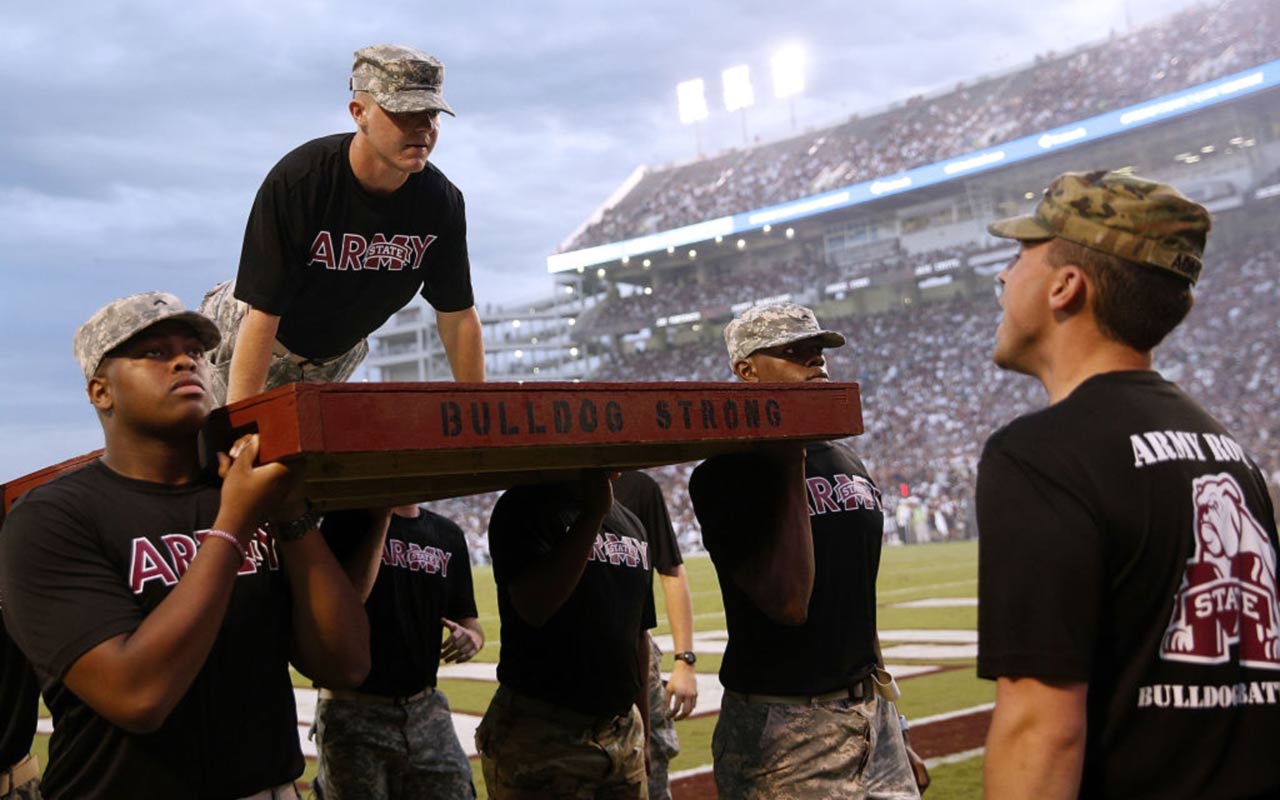
You Need a Solid Backup Plan
We already mentioned that it's hard getting into a military service academy, which by itself should tell you that you need a Plan B, Plan C and Plan D. But you might not realize that your backup plan can actually play a role in determining whether or not you get into a service academy. During interviews with nomination review boards and volunteer admissions representatives, there's a good chance you'll be asked what you're going to do if you don't get an appointment. Your answer could sway their opinion of you one way or the other.
First, having a solid backup plan shows you're prepared for contingencies, which is an important part of military leadership. "It's really important that your backup plan is very well thought-out," Evan Sievers says. "They like to admit people who…aren't just leaning on being given an appointment to the academies. It is hard to get into the academies, so they want see that you did think about your plan if you didn't make it in."
Second, you want to show that your ultimate goal is to serve in the military. "My backup plan was always to go ROTC," Seth Swain tells us, "and if I didn't get into one of the academies, that's what I would have done." That's a common plan—and a good one for service-academy applications.
"I do think it's important to include ROTC in any backup plan," adds Rhett Perry. "It really just shows commitment that, no matter what, you want to serve overall, whether you do it through an academy or through a regular university."
_________________________
MARCHING ORDERS: Consider Other Paths to a Commission
If you don't get into a service academy, there are other ways to get a commission besides going through an ROTC program at a traditional civilian college. We already mentioned a few private military prep schools and military junior colleges (there are others). Some of them offer two-year early commission programs for the Army. There are also other four-year military colleges, such as The Citadel, Virginia Military Institute and Norwich University, where you can earn a ROTC commission. There are also officer candidate schools and other commissioning routes you can take as an enlisted member of the military.
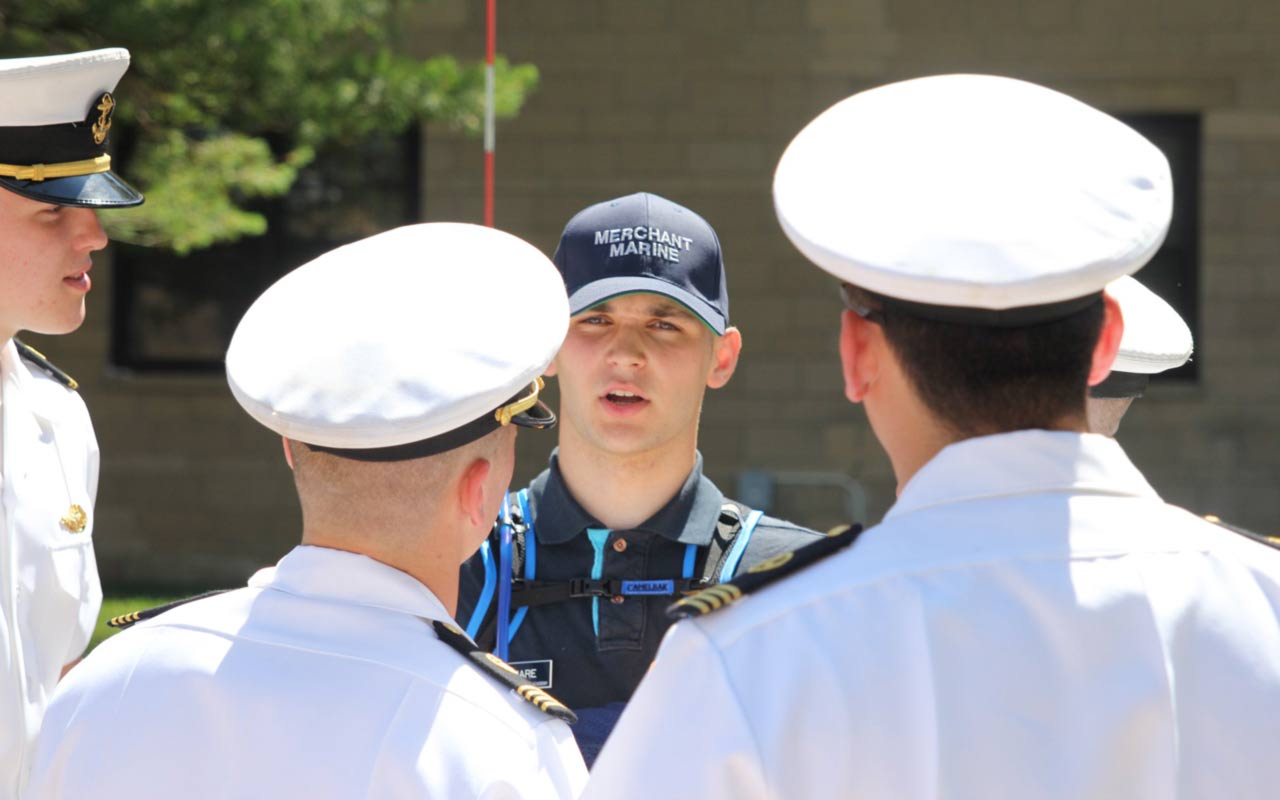
You Can Reapply If You Don't Get in the First Time
One common misconception is that every cadet and midshipman came to a service academy right out of high school. That's just not the case. We already discussed the prep-school route, which funnels young men and women into the service academies one or more years after they graduate from high school. But every year there are also a fair number of other people entering the academies who reapplied after they were rejected the first time around. They followed their backup plan, worked hard to improve their weaknesses and dove headfirst into the application process again. "If you're worth going to [a service academy] and you don't get in the first time, prove them wrong," Sawyer Neal insists. "Show them how bad you want to serve, and that you deserve to be there. And the way you do that is by putting in lots of hard work and reapplying."
If you spend a year at college before reapplying, try to take the same classes that cadets and midshipmen take their first year at the academy of your choice. Neal, who attended the University of Oklahoma before reapplying to the Naval Academy, says the Naval Academy wants to see that you've "taken the courses that you'll be taking at the Naval Academy and that you can be successful in them." It's also "a huge advantage" if you get in the second time around because you've already taken some of the classes. You can't transfer credits from a traditional college to a service academy, though, and you'll still have to go all four years at the academy if you get in on your second try.
_________________________
MARCHING ORDERS: Join ROTC at College If You Plan to Reapply to a Service Academy
"If you apply the first year, you don't get in, and you go to a school that has a ROTC unit, I implore you to go into that and give it your all there as you reapply," Neal advises. He believes his ROTC experience is going to give him an advantage during his plebe year at the Naval Academy because he already knows "the basic knowledge that they're going to be teaching everyone this summer," he has experience working "hand-in-hand with staff sergeants and gunnery sergeants," and he's used to getting "yelled at and intimidated by men who have served 20-plus years in the military."
_________________________
When it comes time to reapply, you'll pretty much have to start from scratch. Connor McGurk, who spent a year at the University of Georgia and then reapplied to West Point, tells us that "there were some things that were already filled out [on my portal], like high school transcripts. I didn't need to submit those again. But I still had to get a nomination and do the CFA again. I could use the same essays, and the recommendation letters were the same. I just had to get the people who wrote them to update the date on them." Your DoDMERB medical exam is good for two years. Neal sees "an advantage in reapplying" and going through the process a second time. "You already know what you're doing. You know what they want. You know what they're looking for," he says. In addition, Neal believes you'll be a stronger candidate "after you've been shot down for something you've work so hard for….They like to see that resiliency. They like to see that never-quit attitude."
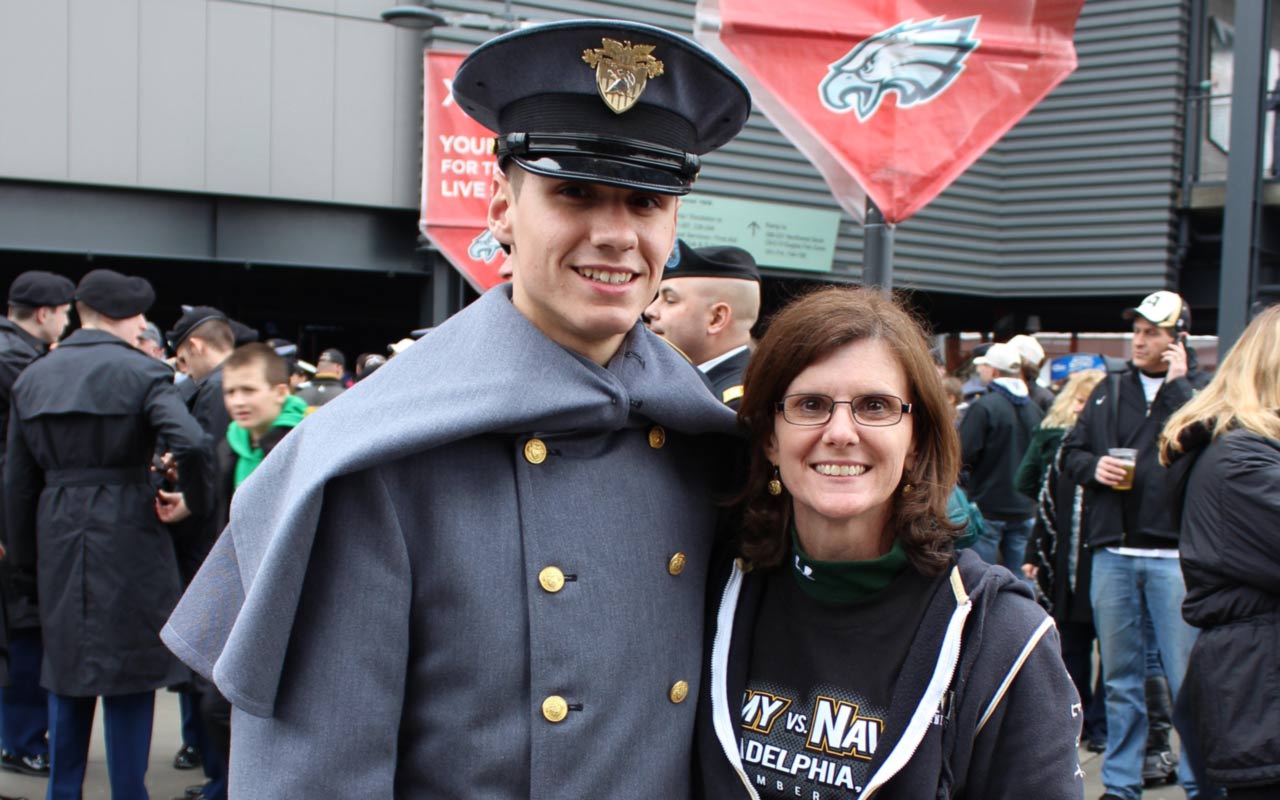
Your Parents Can't Go to the Academy With You
This section is for the parents out there. Take it from me: It's great being a service academy parent! You get to attend military balls, cheer on the sports teams and see lots of parades without ever having to do a single push-up, stay up all night preparing for a room inspection or stand at attention while an upperclassman screams in your face. But please, please, please take my advice: Don't pressure your son or daughter into attending a service academy. I know that most parents would never do such a thing, but it happens. "I was surprised at the summer seminar to see the number of kids who were there because their parents were making them be there," Alexander Kleitz says. "Even at the appointee tour I did, there were kids there who visibly did not want to be there or…talked about how they didn't want to go there but their parents were making them." My own son used to tell me that the students who didn't want to be at the academy stood out like a sore thumb. They didn't do well or simply quit because their heart wasn't in it.
It's also important for parents to let their children take the lead when it comes to working through the admissions process. That doesn't mean you can't help them, though. "You can't do it alone," Jack Felgar admits. "It really helps to have supportive parents who try to keep you organized." That's a good role for parents. You can also help out with things like gathering medical records, practicing for the physical fitness test, reviewing (but not writing) essays and transporting applicants to interviews. You won't be able to help them with paperwork at the academy, so get them (and yourself) used to handling these types of things on their own.
_________________________
MARCHING ORDERS: Talk Out Any Concerns With a Service Academy Parent
Moms and dads who are having a hard time accepting their child's decision to pursue a service academy appointment and military service can reach out to current service academy parents for advice. There are service academy parent clubs throughout the country with members who would love to help you out. (Yes, believe it or not, the parents have their own clubs.) The parent-to-parent support network is really quite amazing, and you shouldn't be shy about tapping into it if you have questions. Click on the following links to find the nearest parent club for the service academy your child wants to attend: West Point, Naval Academy, Air Force Academy, Coast Guard Academy and Merchant Marine Academy. And don't forget to join your local parent club if your son or daughter gets in!
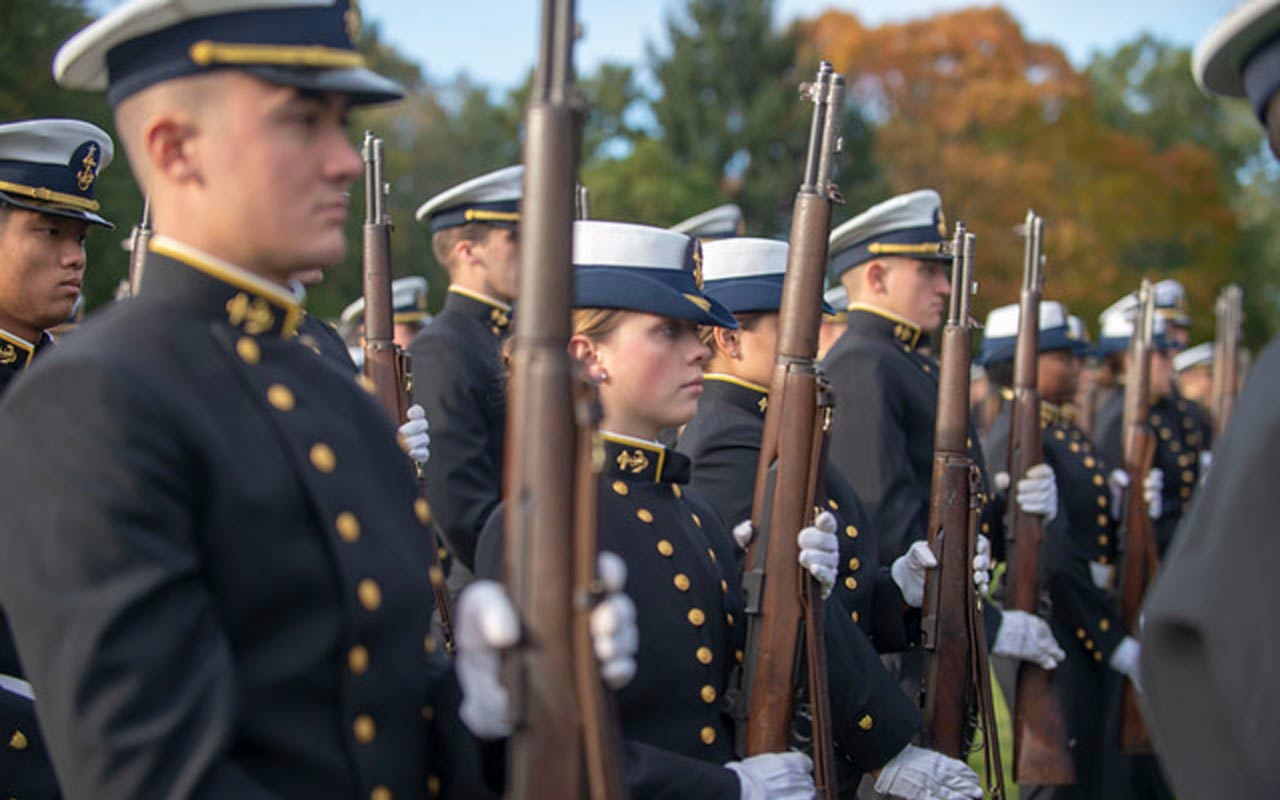
There's a Wealth of Information Out There
We've tried to give you a sense of what the service-academy admissions process is like and some tips to help you successfully maneuver through it. Frankly, however, we just scratched the surface. There's so much more to learn before you begin the process and when you're in it. Fortunately, there's plenty of good information out there.
You can start your research online. In fact, the first thing a prospective applicant should do is go through each page on the admissions office website for the service academy he or she wants to attend. "I was on the Naval Academy website every day," Kayla Malone tells us. That's where you're going to find the most authoritative information about the application process. Click on the following links to get started:
- West Point Admissions;
- Naval Academy Admissions;
- Air Force Academy Admissions;
- Coast Guard Academy Admissions; and
- Merchant Marine Academy Admissions.
There are also online forums, where you can get answers to specific questions you may have. You shouldn't have any problem finding YouTube videos on service-academy admissions, either.
_________________________
MARCHING ORDERS: Check Out Serviceacademyforums.com
We heard several recommendations for serviceacademyforums.com. It's a place where applicants, current students, grads, volunteer admissions representatives, parents and others come together to ask questions, provide answers and discuss the service academies and other military colleges. "I would recommend using the service academy forums online," Jack Felgar says, "because almost any question that you could possibly have has been asked on those forums, and there's a ton of answers from ex-admissions officers and people who've gone through the same process. I was probably on that site every single week that I was filling out my application with random questions. That was really helpful."
_________________________
You'll want to talk face-to-face with current cadets and midshipmen, too. They're a critical source of information, according to the incoming students we interviewed. Getting "the real story from people who are actually there is important," says Alexander Kleitz, while Dominique Basso adds that "nobody really knows the experience like the people who have experienced it firsthand." There are a number of ways you can connect with current academy students. You can attend a summer program or do an overnight visit. You can attend a congressional informational meeting. Current cadets and midshipmen often show up at high schools to speak with interested students. Perhaps you know a friend of a friend who is at an academy. If you put in a little effort, you should be able to find a current cadet or midshipman who can chat with you.
Of course, admissions officers are important people to speak with, too. They cover all corners of the country, so there's a good chance they'll host an informational meeting somewhere near you. Natalie Wong, who's from Honolulu, tells us that "Coast Guard admissions officers came to Hawaii, and that's where I really got a lot of good information about the academy." The volunteer admissions representatives we mentioned earlier are great sources of information as well. Academy graduates can also be very informative, but just keep in mind that certain things at the academies change over time.
Finally, don't forget about old-fashioned books. Dominique Basso mentioned that she "read a few books," including How to Get Into a Military Service Academy, by Michael Dobson. Just another source to check out.
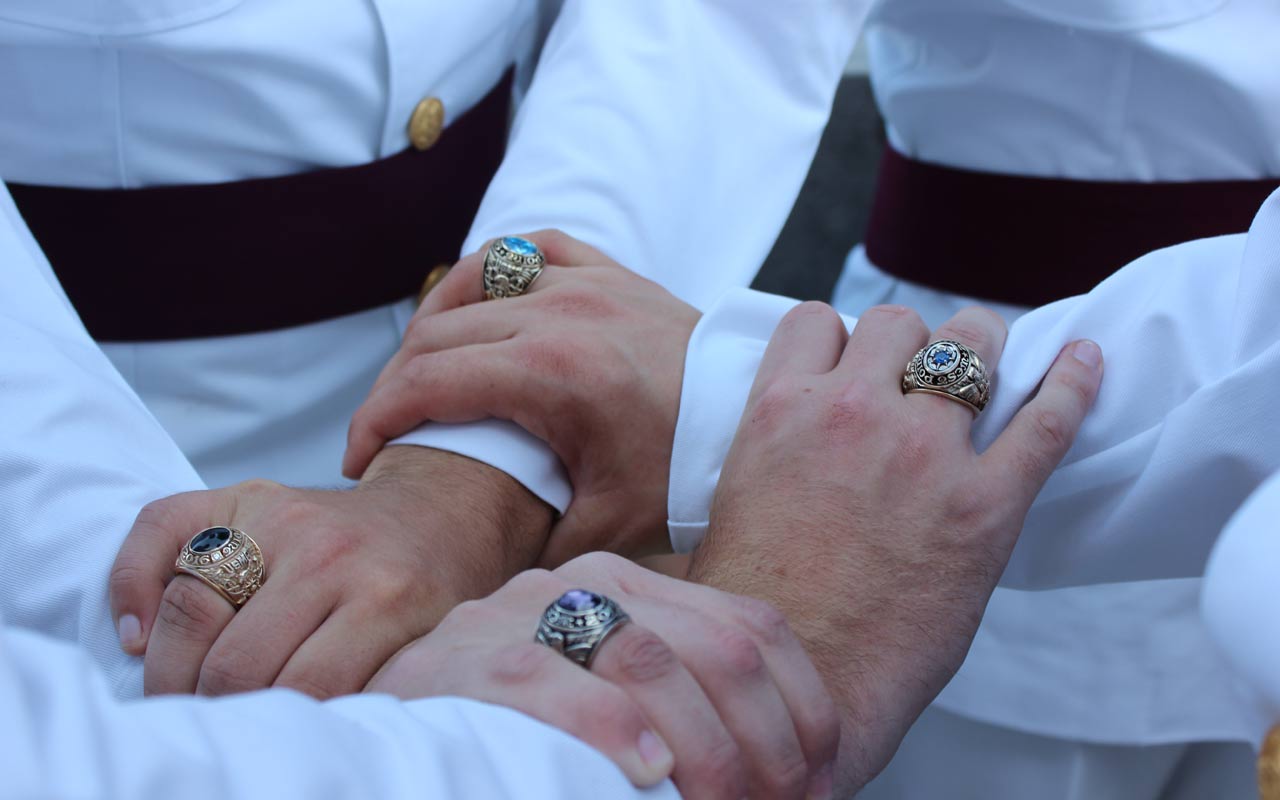
Acknowledgments and Thanks!
We want to thank the young men and women who offered their thoughts and guidance about the service-academy admissions process. Even though they were very busy at the time preparing for their first summer of training, which was just days away when we talked to them, they all graciously and enthusiastically agreed to spend some time with us so students who are a few years younger than they are can benefit from their experience. We wish them all the very best as they fulfill their dreams!
The 19 cadets and midshipmen who contributed to this story are:
- Alex Hooker, from Webster City, Iowa (Naval Academy)
- Alexander Kleitz, from Bridgeton, Mo. (Air Force Academy)
- Andres Santiago, from Broad Run, Va. (U.S. Military Academy at West Point)
- Connor McGurk, from Marietta, Ga. (U.S. Military Academy at West Point)
- Courtney Swift, from Laguna Niguel, Calif. (Air Force Academy)
- Dominique Basso, from East Meadow, N.Y. (Merchant Marine Academy)
- Evan Sievers, from Slinger, Wis. (Air Force Academy)
- Jack Felgar, from Falls Church, Va. (U.S. Military Academy at West Point)
- Kayla Malone, from Gahana, Ohio (Naval Academy)
- Kayla Phillips, from Gilbert, Ariz. (Air Force Academy)
- Lea Walker, from Macon, Ga. (Coast Guard Academy)
- Louis Burts, Jr., from Atlanta, Ga. (U.S. Military Academy at West Point)
- Natalie Wong, from Honolulu, Hawaii (Coast Guard Academy)
- Nathaniel Erickson, from Toledo, Ohio (Naval Academy)
- Renee Nosko, from Leonardtown, Md. (Naval Academy)
- Rhett Perry, from Fayetteville, Ga. (U.S. Military Academy at West Point)
- Sawyer Neal, from Coshocton, Ohio (Naval Academy)
- Seth Swain, from Farmington, Ark. (Air Force Academy)
- Skye Williams, from Snellville, Ga. (U.S. Military Academy at West Point)
Profit and prosper with the best of Kiplinger's advice on investing, taxes, retirement, personal finance and much more. Delivered daily. Enter your email in the box and click Sign Me Up.
Rocky Mengle was a Senior Tax Editor for Kiplinger from October 2018 to January 2023 with more than 20 years of experience covering federal and state tax developments. Before coming to Kiplinger, Rocky worked for Wolters Kluwer Tax & Accounting, and Kleinrock Publishing, where he provided breaking news and guidance for CPAs, tax attorneys, and other tax professionals. He has also been quoted as an expert by USA Today, Forbes, U.S. News & World Report, Reuters, Accounting Today, and other media outlets. Rocky holds a law degree from the University of Connecticut and a B.A. in History from Salisbury University.
-
 Dow Adds 1,206 Points to Top 50,000: Stock Market Today
Dow Adds 1,206 Points to Top 50,000: Stock Market TodayThe S&P 500 and Nasdaq also had strong finishes to a volatile week, with beaten-down tech stocks outperforming.
-
 Ask the Tax Editor: Federal Income Tax Deductions
Ask the Tax Editor: Federal Income Tax DeductionsAsk the Editor In this week's Ask the Editor Q&A, Joy Taylor answers questions on federal income tax deductions
-
 States With No-Fault Car Insurance Laws (and How No-Fault Car Insurance Works)
States With No-Fault Car Insurance Laws (and How No-Fault Car Insurance Works)A breakdown of the confusing rules around no-fault car insurance in every state where it exists.
-
 New Ways to Use 529 Plans
New Ways to Use 529 PlansTax-free withdrawals from 529 plans could help you sharpen your job skills.
-
 I Want to Help Pay for My Grandkids' College. Should I Make a Lump-Sum 529 Plan Contribution or Spread Funds out Through the Years?
I Want to Help Pay for My Grandkids' College. Should I Make a Lump-Sum 529 Plan Contribution or Spread Funds out Through the Years?We asked a college savings professional and a financial planning expert for their advice.
-
 What to Do With Your Tax Refund: 6 Ways to Bring Growth
What to Do With Your Tax Refund: 6 Ways to Bring GrowthUse your 2024 tax refund to boost short-term or long-term financial goals by putting it in one of these six places.
-
 What Does Medicare Not Cover? Eight Things You Should Know
What Does Medicare Not Cover? Eight Things You Should KnowMedicare Part A and Part B leave gaps in your healthcare coverage. But Medicare Advantage has problems, too.
-
 15 Reasons You'll Regret an RV in Retirement
15 Reasons You'll Regret an RV in RetirementMaking Your Money Last Here's why you might regret an RV in retirement. RV-savvy retirees talk about the downsides of spending retirement in a motorhome, travel trailer, fifth wheel, or other recreational vehicle.
-
 How Intrafamily Loans Can Bridge the Education Funding Gap
How Intrafamily Loans Can Bridge the Education Funding GapTo avoid triggering federal gift taxes, a family member can lend a student money for education at IRS-set interest rates. Here's what to keep in mind.
-
 How an Irrevocable Trust Could Pay for Education
How an Irrevocable Trust Could Pay for EducationAn education trust can be set up for one person or multiple people, and the trust maker decides how the money should be used and at what age.
-
 UTMA: A Flexible Alternative for Education Expenses and More
UTMA: A Flexible Alternative for Education Expenses and MoreThis custodial account can be used to pay for anything once the beneficiary is considered an adult in their state. There are some considerations, though.

